Mitchell Hadley's Blog: It's About TV!, page 58
February 17, 2023
Around the dial
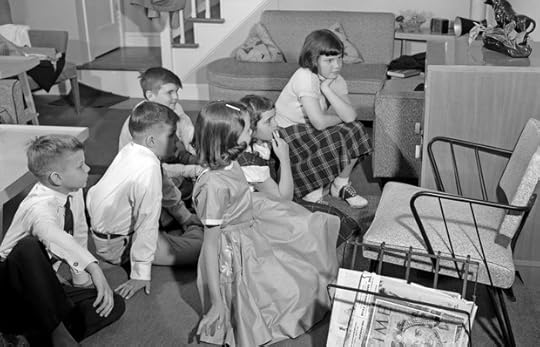
 We'll start this week with a leftover from last week, as F Troop Fridays returns to The Horn Section. Hall looks at the episode "
Captain Parmenter, One Man Army
," and if you remember the series, you know that's a recipe for disaster. Find out what happens to Fort Courage when everyone but Parmenter is suddenly out of the Army?
We'll start this week with a leftover from last week, as F Troop Fridays returns to The Horn Section. Hall looks at the episode "
Captain Parmenter, One Man Army
," and if you remember the series, you know that's a recipe for disaster. Find out what happens to Fort Courage when everyone but Parmenter is suddenly out of the Army?At Cult TV Blog, John has moved on from The Prisoner and starts a series on TV shows from the 1980s, beginning with Scully , which has nothing to do with The X-Files and everything to do with the surreal depiction of the life of a British schoolboy. Any other attempt to describe it would be useless, so check out John for all the details.
We'll stick with British TV for a moment, or at least TV with a British connection; Cult TV Lounge explores Hammer Films' 1980 TV series Hammer House of Mystery and Suspense, a co-production with Fox that should have worked, but didn't. Find out why, and whether or not it had anything to do with Hammer's American partners.
At Drunk TV, Jason looks back at the first season of Magnum, P.I. (the original, which as we know is the only real one), and tells us how Thomas, Rick, T.C., Higgins, and that dynamic Ferrari combine with the gorgeous Hawaiian landscape (and a few shapely adorables along the way) to produce a show that's much loved all these years later.
Speaking of Magnum, Realweegiemidget takes a gander at the sixth episode from that first season; Gill tells us how this episode, " Skin Deep ," is a tribute to the noir classic Laura, with Tom Sellick assuming the Dana Andrews role of the detective trying to find out who killed Laura—er, Erin.
Over at Comfort TV, David shares the top TV moments from the great Sammy Davis Jr. As David mentions, few big stars appeared on episodic television as often as Davis did (occasionally playing himself), and his appearances on shows from Zane Grey Theatre to Charlie's Angels, with a little All in the Family thrown in. Who can beat that, besides the Candy Man?
Finally, Tim McCarver, one of the most familiar voices on baseball broadcasts of the last few decades, and a pretty fair player as well, died Thursday, aged 81. Here's a look back at his career, and the impact that he made. TV
Published on February 17, 2023 05:00
February 15, 2023
The Descent into Hell: The Brotherhood of the Bell (1970)
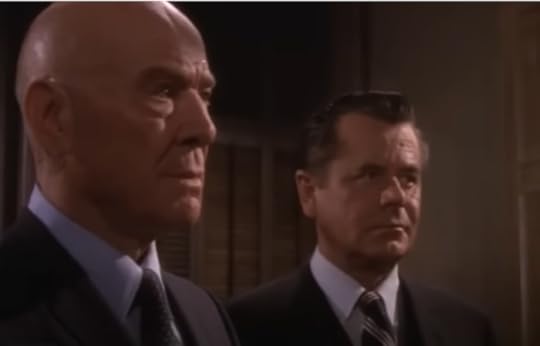
 Imagine, if you will, that you’re a member of an organization—a society, let’s call it. Membership in the society is exclusive, by invitation only, and its purpose is to place its members in positions of influence in business, politics, finance, and academia, so you were greatly honored when you were invited to join. To be a member is a privilege, but not one you can share with others; not only can you not tell your colleagues, your friends, your family, even the very existence of the society is a secret. Through the years, you’ve attained the wealth and power that was promised, but there’s a catch: in return for the advantages you’ve been given, the society may call on you one day to return a favor, one consistent with the status you’ve attained. It’s an offer you won’t be able to refuse, and you know what that means, because once you become a member of this society, there’s no backing down, no way out.
Imagine, if you will, that you’re a member of an organization—a society, let’s call it. Membership in the society is exclusive, by invitation only, and its purpose is to place its members in positions of influence in business, politics, finance, and academia, so you were greatly honored when you were invited to join. To be a member is a privilege, but not one you can share with others; not only can you not tell your colleagues, your friends, your family, even the very existence of the society is a secret. Through the years, you’ve attained the wealth and power that was promised, but there’s a catch: in return for the advantages you’ve been given, the society may call on you one day to return a favor, one consistent with the status you’ve attained. It’s an offer you won’t be able to refuse, and you know what that means, because once you become a member of this society, there’s no backing down, no way out. Is it the World Economic Council, the Trilateral Commission, the Freemasons, the Illuminati?
Or is it the Brotherhood of the Bell?
l l l
David Karp’s 1952 novel, The Brotherhood of Velvet, has been adapted twice for television under the title The Brotherhood of the Bell: once for Studio One on January 6, 1958, with a script by Dale Wasserman and Jack Balch; and again on September 7, 1970, for CBS’s Thursday Night Movie, this time produced and written by Karp himself. Despite differences in each of the three versions, the story is essentially the same: a decent man caught in a trap between his duty to an organization to which he has belonged for his entire adult life, an organization that has played a role in everything he has accomplished; and his duty to himself, his moral code, and his individuality.
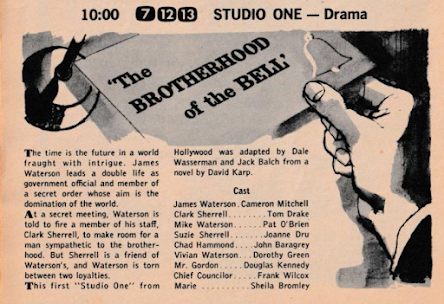
The Brotherhood of the Bell, a society of men who graduated from the exclusive College of St. George in California, is presented as a singular honor, reserved for the best and the brightest. Its members are among the most powerful and influential men in the world, the elites of business, finance, academia, and politics. (When a new member comments that he’s now part of the establishment, he’s told, “We are the establishment.”) To be a member of the Brotherhood is to be set for life—professionally, personally, financially. There a catch, however: in one of the Brotherhood, members must pledge “absolute obedience and absolute secrecy,” and promise to do whatever is asked of them if they’re called upon to do a favor—no questions asked.
At the time, it was generally believed that the Brotherhood was based, at least in part, on Yale’s Skull and Bones society, an organization that has included many of the world’s leaders in, well, business, finance, academia, and politics. Its members have included U.S. presidents and presidential candidates, cabinet members and Supreme Court justices, publishers, corporate executives, and intelligence agents. Two of its members were George W. Bush and John Kerry, who faced each other in the 2004 presidential election; in his autobiography, Bush described Skull and Bones as “a secret society; so secret, I can't say anything more,” a description that both Bush and Kerry reiterated when asked by Tim Russert on Meet the Press.
In the book and the Studio One production, our protagonist, Jim Watterson (played by Cameron Mitchell) “lead[s] a double life as government official [with the State Department] and member of a secret order whose aim is the domination of the world.” In Karp’s 1970 version, which is available on YouTube and DVD and which we’ll be using as the primary reference point, his name is Andrew Patterson (Glenn Ford), a respected professor working at a prestigious institute. In either case, he’s about to find out just what it costs to “belong” to the Brotherhood of the Bell.
l l l
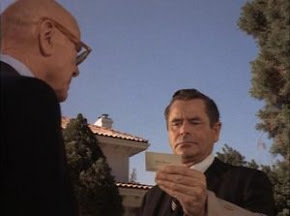 Dean Jagger (L) and Glenn FordThe story opens at the College of St. George, where Patterson is attending the ritual induction of a new member, Dunning (Robert Pine), whom he is sponsoring. Presiding over the induction is financier Chad Harmon (Dean Jagger), the man who sponsored Patterson 22 years ago. Since then, Patterson has gone on to a successful career in academia, currently serving as professor and head of the Institute for the Study of Western Civilization. Following the ritual, Patterson is told that the Brotherhood is now calling in the note, so to speak; they have an assignment for him.
Dean Jagger (L) and Glenn FordThe story opens at the College of St. George, where Patterson is attending the ritual induction of a new member, Dunning (Robert Pine), whom he is sponsoring. Presiding over the induction is financier Chad Harmon (Dean Jagger), the man who sponsored Patterson 22 years ago. Since then, Patterson has gone on to a successful career in academia, currently serving as professor and head of the Institute for the Study of Western Civilization. Following the ritual, Patterson is told that the Brotherhood is now calling in the note, so to speak; they have an assignment for him. He has been assigned to prevent a close friend and colleague of his, Dr. Konstantin Horvathy (Eduard Franz), from accepting a deanship at a college of linguistics—a position that the Brotherhood has reserved for one of their own. Patterson is given a list of names of agents who helped Horvathy defect to the United States from behind the Iron Curtain, and is told to blackmail Horvathy by threatening to reveal the names of these agents (virtually guaranteeing their deaths) unless he declines the position.
Already apprehensive about the assignment, Patterson tries desperately to convince Horvathy to turn down the position; when he refuses, he hands Horvathy a copy of the list and tells him what he will be forced to do. Horvathy, a political refugee and lifelong opponent of communism, is shocked by Patterson’s revelation and feels betrayed by his old friend; rather than buckle under the threat, he commits suicide.
Horvathy’s death has a profound effect on Patterson, who knows that it was his pressure that caused the suicide. Patterson is sickened by his role in the death of his friend, and how the Brotherhood (with his cooperation), has taken away his humanity, he falls into a depression that is, what? Self-loathing? Suffocating guilt? A desire for revenge? The hope of redemption? All four?
In order to scourge himself of the effects from his membership with the Brotherhood, Patterson becomes determined to bring down the Brotherhood. He first confesses, and I think that’s the right word, to his wife Vivian (Rosemary Forsyth) about his involvement with the Brotherhood, as a way to explain the depth of his guilt. She suggests he talk with her father, Harry Masters (Maurice Evans), a powerful real estate tycoon with a knack for knowing the right thing to do. Taking Patterson’s story seriously, Masters introduces him to Burns, a federal agent who tells assures him that the government is aware of the Brotherhood, and takes the instructions and list of names from Patterson to use in the investigation.
So far, so good. But when Patterson goes back to the location where he met the agent, he finds there is no agent and no sign of the office in which they met. He contacts the agency (obviously the FBI, although not referred to by that name), and they tell him they don’t have any agent Burns. Patterson, increasingly alarmed by this turn, tells them to call Masters to confirm his story, but his father-in-law denies any knowledge of their conversation or the meeting with Burns, and suggests that his son-in-law is on the verge of a mental breakdown due to recent events.
The pressure on Patterson mounts. the foundation financing the Institute eliminates his department, putting him and everyone else who works with him out of a job. He flies to San Francisco to confront Harmon and threatens to expose him, but Harmon accuses him of ingratitude toward the Brotherhood and then delivers the crushing blow: it is because of the Brotherhood that he’s had had every job, received every fellowship, even met and married his wife. They even arranged for the construction company owned by Patterson’s father Mike to receive important contracts, making him a millionaire. “You have never competed for one thing in the 22 years since you took your oath at sunrise,” he tells Patterson, and while it’s vital to his belief in himself to think otherwise, deep down he fears it’s true. The media ridicules him and the DA refuses to investigate; today they’d call him a Conspiracy Theorist, and accuse him of wearing a tinfoil hat.
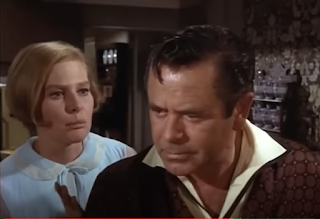 Patterson tells Vivian to "get out"There’s more: Mike (Will Geer), who believes his son completely and has vowed to fight with him, becomes the subject of an IRS investigation during which they find planted documents pointing to his guilt. Shortly thereafter, Mike suffers a stroke and dies. Vivian, hearing an intruder downstairs in their home while Patterson is at the hospital with Mike, winds up shooting their neighbor, who says he was just checking on things. He could be telling the truth, or the Brotherhood could be trying to frame her as a warning to Patterson. Vivian, angered that Patterson’s actions have put them in this position, urges him to just forget everything; she assures him that her father can always give him a job. Patterson, realizing that his whole life has been a lie and that Vivian was never really his, tells her to get out.
Patterson tells Vivian to "get out"There’s more: Mike (Will Geer), who believes his son completely and has vowed to fight with him, becomes the subject of an IRS investigation during which they find planted documents pointing to his guilt. Shortly thereafter, Mike suffers a stroke and dies. Vivian, hearing an intruder downstairs in their home while Patterson is at the hospital with Mike, winds up shooting their neighbor, who says he was just checking on things. He could be telling the truth, or the Brotherhood could be trying to frame her as a warning to Patterson. Vivian, angered that Patterson’s actions have put them in this position, urges him to just forget everything; she assures him that her father can always give him a job. Patterson, realizing that his whole life has been a lie and that Vivian was never really his, tells her to get out. Patterson reaches the nadir when he appears on a local talk show to discuss the Brotherhood and is humiliated by the host (William Conrad at his malevolent best; think of a cross between Morton Downey Jr. and Jerry Springer). Even more demoralizing is his discovery that the only people who take his accusations seriously are crazies and other conspiracy buffs. Patterson touches off a brawl in the studio, and winds up in jail.
l l l
We probably ought to pause for a moment here and take stock of where we are.
Earlier, I mentioned differences in the three versions of Brotherhood of the Bell. In Karp’s novel and the Studio One version, Watterson (the Patterson character) works for the State Department, and is asked to fire his assistant and friend, Clark Sherrell and replace him with a member of the Brotherhood. The betrayal is that much more personal; Sherrell is not just a colleague, but Waterson’s assistant. Further, the evidence which they want Watterson to use against Sherrell is that he engaged in homosexual activity when he was a teenager. It’s a charge that’s very much of its time; both the communists and the anti-communists were known for using the homosexual angle in blackmail. Not having seen the Studio One version of Brotherhood, I don’t know if 1950s television would have gone there; since the names and premise are the same as in the book, I wouldn’t be surprised that it was some sort of sex scandal such as infidelity that was substituted.
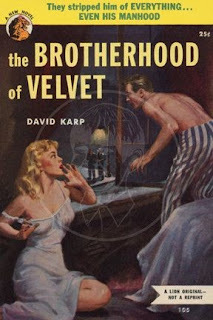 (Incidentally, that 1958 Studio One production is said to be set in the near future: 1976. That would have been the Bicentennial year, the 200th anniversary of American independence. Is there a message to that, a reminder of what the country was founded on?) And despite the lurid paperback cover, the issue of sex is incidental to Karp’s story; if anything, it’s used as a metaphor for what it means to be a man—to be independent, to think for yourself, to stand on your own two feet and make your own life. Having just found out that none of his accomplishments have been due to his own efforts, Watterson has been, in a sense, emasculated. This same feeling is accomplished through other means in the 1970 production, but the net result is the same: a hollowed-out man, a man at his most vulnerable.
(Incidentally, that 1958 Studio One production is said to be set in the near future: 1976. That would have been the Bicentennial year, the 200th anniversary of American independence. Is there a message to that, a reminder of what the country was founded on?) And despite the lurid paperback cover, the issue of sex is incidental to Karp’s story; if anything, it’s used as a metaphor for what it means to be a man—to be independent, to think for yourself, to stand on your own two feet and make your own life. Having just found out that none of his accomplishments have been due to his own efforts, Watterson has been, in a sense, emasculated. This same feeling is accomplished through other means in the 1970 production, but the net result is the same: a hollowed-out man, a man at his most vulnerable. l l l
One of the most tender of all human vulnerabilities is the secret, and there is a reason why so many of us are so sensitive to it. Whether it be the diary of a teenage girl, the pseudonymous writings of a blogger, or the innermost confidences we share with a best friend, a secret exposes our most intimate thoughts and provides something of a window into the human soul: the hopes and fears and aspirations, but also the guilt and the wrongdoing and the unmasking of the truth. One of the reasons why the Catholic Church maintains the inviolability of the Seal of Confession is that reconciliation with God demands nothing less than complete, total honesty regarding sin, a candor that can be achieved only through its confidentiality.
Is it any wonder, then, that the thought of having these secrets exposed in public, whether to anonymous strangers, co-workers, or our own family and friends, chills our bones and fills us with an inexplicable dread? Even reality stars, who often seem to have no secrets whatsoever (nor any shame), use their shows at least partly to maintain control over the revelations of those secrets. Just look at what happens when some frenemy spills the beans: tears, screaming, and slap fights abound. And let’s face it, they still have secrets. Listen to what they admit, and then ask yourself how embarrassing must be those things they wouldn’t admit. (And while you’re at it, ask yourself as well if you don’t think them capable of doing those very things.)
We've gotten used to losing privacy in the name of convenience; what's security when compared to being able to have Siri take care of your needs just by saying the word. But the thought of an organization that as a file on you, filled with those secrets that you'd rather never see the light of day—that seems to cross a line for people (unless, of course, you're the one gathering the information). We’re outraged, offended, filled with rage. “You have no right!” we say. But in the very next instant, we’re overcome by dread and fear. What if someone were to find out? The secrets could be trivial embarrassments, law-breaking admissions, or something in-between; it might even be something that’s not your fault, but is difficult to explain. It makes no difference. It’s why blackmail never goes out of for style, and private detectives never go out of business. (It’s also why so many blackmailers wind up being murdered, at least on television.) Many people—maybe most—would do anything to keep those secrets from becoming public.
There’s one thing that we understand, though: there’s something wrong about an organization that collects and uses this kind of information. It is itself a secretive organization: a government agency, a public safety department, an organization filled with nameless, faceless bureaucrats, a human resources department; and it trafficks in all kinds of personal information, from your race to your "gender identification" to your vaccination status. This information could cost you the chance at a job, a loan, a business transaction; they won't really tell you how it comes into play, and the fact that they deal in secrets while remaining secret themselves is the icing on the cake. The people in charge of these organizations may use various rationale to justify their actions: national security, for instance, or public safety, or the ever-popular diversity. They may say that their goals are noble ones, such as the public good, or the survival of the planet; like your parents, they may say that it hurts them more than it does you. But, when they explain it to you this way, they expect you to understand that they’re only threatening to expose you in the name of a higher good. There’s nothing personal about it. It’s even for your own good, and if you don’t understand this, you’re just being selfish.
Or even worse, they’ll start a whispering campaign against you, one that gets louder as you resist them. They’ll accuse you of the worst possible mental illness known to man: being a conspiracy believer. Conspiracy becomes the dirty word of all dirty words, as if the mere suggestion means nothing you say matters.
l l l
And now the ending. One reviewer suggests that for the 1970 production, “apparently some idiot network executive made writer Karp tack on a schlocky hopeful ending”; a review of the book suggests a certain ambiguity; “Is it truly a plot or has Jim lost his mind and imagined it all as a result of paranoid schizophrenia?” Again, it would be interesting to know how Studio One brought the story to a conclusion, but I suspect it would be closer to the 1970 ending; television shows of the 1950s weren’t much for ambiguous endings, but it’s not impossible. But let’s discuss the ending we have, not the endings we lack.
Patterson is bailed out of jail by a most unlikely person: his boss at the Institute for the Study of Western Civilization, Jerry Fielder (William Smithers). Patterson has suspected Fielder of being part of the Brotherhood as well, but now it turns out that Fielder has been doing some investigating of his own, and has found that Patterson has been blacklisted from working for any other academic institutions. He believes Patterson’s story about the Brotherhood, but tells him he must find another member who can verify its existence.
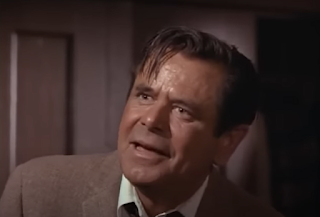 In desperation, he returns to St. George, to Dunning, the man he sponsored for membership at the movie’s opening, and pleads with Dunning to join him—to bring down the Brotherhood for his own good as much as that of the world. “You’ve either got to be at war with them or you’re in their service!” he says. “Come with me and you’re free of the Brotherhood!” At first it appears that Dunning’s loyalties will remain with the Brotherhood, but as the movie ends, he joins Patterson at the airport, apparently enlisting in his campaign.
In desperation, he returns to St. George, to Dunning, the man he sponsored for membership at the movie’s opening, and pleads with Dunning to join him—to bring down the Brotherhood for his own good as much as that of the world. “You’ve either got to be at war with them or you’re in their service!” he says. “Come with me and you’re free of the Brotherhood!” At first it appears that Dunning’s loyalties will remain with the Brotherhood, but as the movie ends, he joins Patterson at the airport, apparently enlisting in his campaign. l l l
It's difficult to know where paranoia begins and ends in a story like this, one that’s equal parts Kafta and Koestler. (The Brotherhood of the Bell has been described variously as anything from a political thriller to a horror story.) One way of looking at it is to see it everywhere: Dunning only appears to join Patterson, but in reality he’s there to keep an eye on him, to eliminate him as a threat to the Brotherhood. But that’s far too cynical for me, and besides, it’s not consistent with the way the scene is played. Dunning has pledged himself to the Brotherhood; Patterson himself is the one who has brought him in. And now Patterson is telling him, in effect, that everything was a lie, that the Brotherhood is an evil organization determined to control the key sources of power in the world. That’s a hell of a shock for anyone to have to absorb; under the circumstances, Dunning’s hesitancy is all too real.
How would we react in such a situation, being asked to turn against an organization we’ve so recently joined, an organization which promises us everything—an organization which Patterson himself built up in prestige? Would we dismiss Patterson and his story as the ravings of a crazy man?
Or would we consider the alternative, that everything Patterson says—about the Brotherhood and about its control over us—is true? Would we be afraid to join Patterson, or afraid not to join him.
It’s that fear that organizations like the Brotherhood count on—and themselves fear.
l l l
In addition to writing seven novels under his own name, David Karp went on to a successful career as a writer for television; besides his script for the 1970 version of Brotherhood of the Bell, he wrote for series from The Untouchables and The Defenders (winning an Emmy for writing in 1965) to I Spy and Quincy, and created the legal dramas Hawkins (starring James Stewart) and The Storefront Lawyers. A recurring theme in his work, as Philip Boakes points out in a forward to one of his Karp’s novels, is “the pressure on the individual to conform,” whether that pressure be applied from the state (as in his script for the Playhouse 90 drama “The Plot to Kill Stalin,” or from society itself in the sense of prestige and position.
In 1955, Karp adapted his novel One, written in 1953, for Kraft Television Theatre. (It was also made into a British TV production the following year.) Described as a “political fantasy” in TV Guide and “dystopian fiction” by others, the story concerns a future society “on its way to a self-proclaimed perfection which consists in dissension having been rooted out and every citizen identifying his or her own interests with those of the ‘benevolent State.’ In order to achieve this aim, an enormous state apparatus has devised a sophisticated system of surveillance, subtle forms of re-education and, if necessary, brainwashing.”
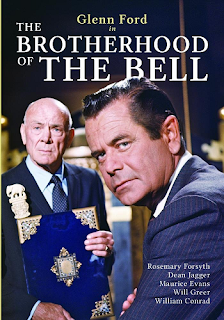 What sets Karp’s stories apart is their timelessness, their ability to offer us a shadowy, shape-shifting antagonist with the ability to adapt to any given period in history. The fear and paranoia, the mysterious masters pulling all the strings—contemporary critics have been quite right to liken it to the McCarthy blacklists and the Stalin purges, but we can also see in in the elite with their secret societies, the government infiltration of organizations deemed “threatening,” the ever-expanding surveillance state, the suffocating conformity of the corporate workplace, the social-media censorship of those who question the official line. They are timeless because the desire for absolute power is timeless, and the determination of the powerful to do anything necessary to keep that power is timeless. They are timeless because evil is timeless, and it doesn’t matter where you live, because evil recognizes no borders.
What sets Karp’s stories apart is their timelessness, their ability to offer us a shadowy, shape-shifting antagonist with the ability to adapt to any given period in history. The fear and paranoia, the mysterious masters pulling all the strings—contemporary critics have been quite right to liken it to the McCarthy blacklists and the Stalin purges, but we can also see in in the elite with their secret societies, the government infiltration of organizations deemed “threatening,” the ever-expanding surveillance state, the suffocating conformity of the corporate workplace, the social-media censorship of those who question the official line. They are timeless because the desire for absolute power is timeless, and the determination of the powerful to do anything necessary to keep that power is timeless. They are timeless because evil is timeless, and it doesn’t matter where you live, because evil recognizes no borders. And yet we can’t deny that times have changed. If evil has always been here, it’s also true that over time, evil becomes less and less selective about those on whom its shadow falls. Perhaps the most frustrating aspect is that those who put this evil into motion don’t even bother to hide their footprints anymore. They follow the plan so closely, so predictably, that it’s as if they don’t care that you know what they’re doing. When confronted with the evidence, they simply whisper a few well-chosen words in a few well-chosen ears—conspiracy—as if that’s all that’s needed to discredit you. Meanwhile it’s still sunny where we stand, and anyway, they didn’t say anything on the morning news about clouds, and you can take it to the bank. Right?
Then night falls, and everyone is as quiet as a church mouse. TV
OTHER ENTRIES IN THIS SERIES: 1984 Darkness at Noon Dialogues of the Carmelites The Obsolete Man Murder in the Cathedral Number 12 Looks Just Like You The Children's Story. . . but not just for children Moloch A Taste of Armageddon The Architects of Fear
Published on February 15, 2023 05:00
February 13, 2023
What's on TV? Monday, February 16, 1970

 We're back in Northern California this week, minus the Bay Area, which appears in select local listings at the back of the issue. I discussed NBC's specials on Saturday, but we've still got some things to look at. Carol Burnett (9:00 p.m., CBS) has her annual "family" show tonight, with no guest stars--only the regular cast. Of course, that means no Tim Conway, since he was a guest star for most of the run of the show. On NET Playhouse's production of "The Changeling" (10:00 p.m.), one of the cast members is Patrick Troughton, who just left Doctor Who last year. KTXL offers a belated celebration of Abraham Lincoln's birthday with the movie "The Tall Target" (6:30 p.m.), starring Dick Powell as a New York policeman trying to prevent Honest Abe's assassination (hint: he fails). And It Takes a Thief (7:30 p.m., ABC) presents a repeat of "The Great Casino Robbery," the episode that introduced Fred Astaire as Alexander Mundy's father Alister. Pretty good night at that.
We're back in Northern California this week, minus the Bay Area, which appears in select local listings at the back of the issue. I discussed NBC's specials on Saturday, but we've still got some things to look at. Carol Burnett (9:00 p.m., CBS) has her annual "family" show tonight, with no guest stars--only the regular cast. Of course, that means no Tim Conway, since he was a guest star for most of the run of the show. On NET Playhouse's production of "The Changeling" (10:00 p.m.), one of the cast members is Patrick Troughton, who just left Doctor Who last year. KTXL offers a belated celebration of Abraham Lincoln's birthday with the movie "The Tall Target" (6:30 p.m.), starring Dick Powell as a New York policeman trying to prevent Honest Abe's assassination (hint: he fails). And It Takes a Thief (7:30 p.m., ABC) presents a repeat of "The Great Casino Robbery," the episode that introduced Fred Astaire as Alexander Mundy's father Alister. Pretty good night at that.-3- KCRA (SACRAMENTO) (NBC) MORNING 6:00 RHYME AND REASON 7:00 TODAY -C- Guests: Mervyn Le Roy, Truri Wideroe 9:00 IT TAKES TWO—Game -C- Guests: Michael Landon, Kent McCord, William Shatner and wives 9:25 NEWS—Nancy Dickerson -C- 9:30 CONCENTRATION -C- 10:00 SALE OF THE CENTURY -C- 10:30 HOLLYWOOD SQUARES -C- Guests: Richard Crenna, Teresa Graves, Joyce Haber, Jan Murray, Jane Russell, Alan Sues. Regulars: Wally Cox, Rose Marie, Charley Weaver. Host: Peter Marshall 11:00 JEOPARDY—Game -C- 11:30 WHO, WHAT OR WHERE -C- 11:55 NEWS—Edwin Newman -C- AFTERNOON 12:00 NEWS -C- 1:00 DOCTORS—Serial -C- 1:30 ANOTHER WORLD -C- 2:00 BRIGHT PROMISE—Serial -C- 2:30 MOVIE—Drama “The Story on Page One” (1960) Part 1 4:00 BATMAN—Adventure -C- Guest villain: Eli Wallach (Mr. Freeze) 4:30 STAR TREK—Drama -C- 5:30 DICK VAN DYKE—Comedy EVENING 6:00 NEWS—Huntley/Brinkley -C- 6:30 NEWS—Whitten/Harvey -C- 7:30 MY WORLD—Comedy -C- 8:00 LAUGH-IN -C- Guest: Dan Blocker 9:00 BOB HOPE -C- Special: Guests: Bing Crosby, Ray Bolger, Johnny Cash, Raquel Welch [The network movie is pre-empted] 10:00 SMOTHERS BROTHERS -C- Special: Guests: Peter Fonda, Glen Campbell, David Frye, David Steinberg, Bob Einstein 11:00 NEWS -C- 11:30 JOHNNY CARSON -C- From Hollywood. Guests: Jack Lemmon, Don Adams, Vikki Carr 1:00 NEWS -C-
-6- KVIE (SACRAMENTO) (EDUC.) MORNING 9:15 CLASSROOM—Lessons Recess: 2:30-5:15 P.M. 11:30 SESAME STREET -C- Guest: Lou Rawls AFTERNOON 12:30 MISTEROGERS—Children 5:15 FRIENDLY GIANT—Children 5:30 SESAME STREET—Children Guest: Lou Rawls EVENING 6:30 MISTEROGERS—Children 7:00 WHAT’S NEW—Children 7:30 YOUNG MUSICAL ARTISTS 8:00 WORLD PRESS—Report -C- 9:00 NET JOURNAL -C- “Who Invited US?” 10:00 NET PLAYHOUSE “The Changeling” [After the play, NET president James Day talks with Nancy Hanks, chairman of the National Council for the Arts.] 11:30 FLASH GORDON—Serial Chapter 11
7 KRCR (REDDING) (ABC, NBC) MORNING 7:00 TODAY -C- Guests: Mervyn Le Roy, Truri Wideroe 9:00 IT TAKES TWO—Game -C- Guests: Michael Landon, Kent McCord, William Shatner and wives 9:25 NEWS—Nancy Dickerson -C- 9:30 CONCENTRATION -C- 10:00 SALE OF THE CENTURY -C- 10:30 HOLLYWOOD SQUARES -C- Guests: Richard Crenna, Teresa Graves, Joyce Haber, Jan Murray, Jane Russell, Alan Sues. Regulars: Wally Cox, Rose Marie, Charley Weaver. Host: Peter Marshall 11:00 JEOPARDY—Game -C- 11:30 WHO, WHAT OR WHERE -C- 11:55 NEWS—Reeler -C- AFTERNOON 12:00 LIFE WITH LINKLETTER -C- Guest: F. Lee Bailey 12:30 DAYS OF OUR LIVES -C- 1:00 DOCTORS—Serial -C- 1:30 ANOTHER WORLD -C- 2:00 NEWLYWED GAME -C- 2:30 DATING GAME -C- 3:00 GENERAL HOSPITAL -C- 3:30 ONE LIFE TO LIVE -C- 4:00 DARK SHADOWS—Serial -C- 4:30 LET’S MAKE A DEAL—Game -C- 5:00 THAT GIRL—Comedy -C- 5:30 NEWS -C- EVENING 6:30 NEWS—Huntley/Brinkley -C- 7:00 FBI -C- 8:00 LAUGH-IN -C- Guest: Dan Blocker 9:00 BOB HOPE -C- Special: Guests: Bing Crosby, Ray Bolger, Johnny Cash, Raquel Welch [The network movie is pre-empted] 10:00 SMOTHERS BROTHERS -C- Special: Guests: Peter Fonda, Glen Campbell, David Frye, David Steinberg, Bob Einstein 11:00 NEWS -C- 11:30 JOHNNY CARSON -C- From Hollywood. Guests: Jack Lemmon, Don Adams, Vikki Carr
9 KIXE (REDDING) (NET) MORNING 9:00 CLASSROOM—Lessons Recess: 4-5:30 P.M. 11:30 SESAME STREET Guest: Lou Rawls AFTERNOON 3:00 SESAME STREET—Children Guest: Lou Rawls 5:00 MISTEROGERS—Children 5:30 SESAME STREET—Children Guest: Lou Rawls EVENING 6:30 WHAT’S NEW—Children 7:00 NEWSROOM—Mel Wax 8:00 WORLD PRESS—Report 9:00 NET JOURNAL “Who Invited US?” 10:00 WILLIAM F. BUCKLEY JR. “Agnew and the Media.” Guest: Herb Klein
10 KXTV (SACRAMENTO) (CBS) MORNING 6:00 LIVING WORD—Religion -C- 6:15 INDUSTRY ON PARADE 6:30 SUNRISE SEMESTER -C- Iranian culture: the court and palaces 7:00 NEWS—Joseph Benti -C- 8:00 CAPTAIN KANGAROO -C- 9:00 LUCILLE BALL -C- 9:30 BEVERLY HILLBILLIES -C- 10:00 ANDY GRIFFITH 10:30 LOVE OF LIFE—Serial -C- 11:00 WHERE THE HEART IS -C- 11:25 NEWS—Chris Harris -C- 11:30 SEARCH FOR TOMORROW—Serial -C- AFTERNOON 12:00 NEWS -C- 12:30 AS THE WORLD TURNS -C- 1:00 LOVE IS A MANY-SPLENDORED THING—Serial -C- 1:30 GUIDING LIGHT—Serial -C- 2:00 SECRET STORM—Serial -C- 2:30 EDGE OF NIGHT—Serial -C- 3:00 MIKE DOUGLAS—Variety -C- Co-host: Red Buttons. Guests: Tony Bennett, F. Lee Bailey, Dody Goodman 4:30 GOMER PYLE, USMC -C- 5:00 BEAT THE CLOCK—Game -C- Guest: Gloria De Haven 5:30 NEWS—Walter Cronkite -C- EVENING 6:00 NEWS -C- 7:00 HAVE GUN—WILL TRAVEL 7:30 GUNSMOKE -C- 8:30 HERE’S LUCY—Comedy -C- 9:00 MAYBERRY R.F.D. -C- 9:30 DORIS DAY—Comedy -C- 10:00 CAROL BURNETT -C- 11:00 NEWS -C- 11:30 MOVIE—Mystery -C- “See How They Run” (1964)
12 KHSL (CHICO) (ABC, CBS) MORNING 6:30 FILM -C- 7:00 NEWS—Joseph Benti -C- 8:00 CAPTAIN KANGAROO -C- 9:00 LUCILLE BALL -C- 9:30 BEVERLY HILLBILLIES -C- 10:00 ANDY GRIFFITH 10:30 LOVE OF LIFE—Serial -C- 11:00 WHERE THE HEART IS -C- 11:25 NEWS—Douglas Edwards -C- 11:30 SEARCH FOR TOMORROW—Serial -C- AFTERNOON 12:00 BEWITCHED—Comedy -C- 12:30 AS THE WORLD TURNS -C- 1:00 LOVE IS A MANY-SPLENDORED THING—Serial -C- 1:30 GUIDING LIGHT—Serial -C- 2:00 SECRET STORM—Serial -C- 2:30 EDGE OF NIGHT—Serial -C- 3:00 GOMER PYLE, USMC -C- 3:30 ALL MY CHILDREN—Serial -C- 4:00 PERRY MASON—Mystery 5:00 NEWLYWED GAME -C- 5:30 NEWS -C- EVENING 6:30 NEWS—Walter Cronkite -C- 7:00 BEWITCHED—Comedy -C- 7:30 GUNSMOKE -C- 8:30 HERE’S LUCY—Comedy -C- 9:00 MAYBERRY R.F.D. -C- 9:30 DORIS DAY—Comedy -C- 10:00 CAROL BURNETT -C- 11:00 NEWS -C- 11:30 MERV GRIFFIN -C- From Hollywood. Guests: Freddy Martin and his orchestra, Phil Silvers, Polly Bergen, Pamela Mason
13 KOVR (SACRAMENTO) (ABC) MORNING 5:55 NEWS -C- 6:00
POLICE AND THE COMMUNITYDebut 7:00 AGRICULTURE TODAY -C- 7:15 CARTOONLAND—Children -C- 9:00 STEVE ALLEN—Variety -C- Guests: Allan Sherman, Monty Landis, George Yanok 10:30 DIVORCE COURT—Drama -C- 11:00 NEWS—Rasheigh -C- 11:30 GALLOPING GOURMET -C- Floating Island AFTERNOON 12:00 BEWITCHED—Comedy -C- 12:30 THAT GIRL—Comedy -C- 1:00 ALL MY CHILDREN—Serial -C- 1:30 LET’S MAKE A DEAL—Game -C- 2:00 NEWLYWED GAME -C- 2:30 TRUTH OR CONSEQUENCES -C- 3:00 GENERAL HOSPITAL -C- 3:30 ONE LIFE TO LIVE -C- 4:00 DARK SHADOWS—Serial -C- 4:30 GILLIGAN’S ISLAND -C- 5:00 I LOVE LUCY—Comedy 5:30 NEWS—Reynolds/Smith -C- EVENING 6:00 NEWS -C- 6:30 PERRY MASON—Mystery 7:30 IT TAKES A THIEF -C- 8:30 MOVIE—Drama “Desire Under the Elms” (1958) 11:00 NEWS -C- 11:30 DICK CAVETT -C- Guests: John Hartford, Terry Sothern 1:00 NEWS -C-
19 KLOC (MODESTO) (Ind.) MORNING 6:50 FARM SHOW 7:00 CHESTER SMITH—Variety 8:30 WARREN STONE—Variety 10:30 FILM AFTERNOON 12:00 NEWS 12:05 MIKE STEWART—Variety 2:00 NEWS 2:05 KEN BELLVILLE—Variety 4:00 NEWS 4:05 GLENN STEPP—Variety EVENING 6:00 NEWS 6:05 AUCTION—Warren Stone
40 KTXL (SACRAMENTO) (Ind.) MORNING 10:50 FELIX—Children -C- 11:00 ROMPER ROOM—Children -C- 11:30 KARTOON KARNIVAL -C- 11:55 TRIM TIME—Exercise -C- AFTERNOON 12:00 LIFE WITH LINKLETTER -C- Guest: F. Lee Bailey 12:30 DAYS OF OUR LIVES -C- 1:00 MOVIE—Drama “Open Secret” (1948) 2:30 NAME DROPPERS—Game -C- Guests: Anne Baxter, Johnny Mathis, Charles Nelson Reilly, Al Lohman, Roger Barkley 3:00 BUGS BUNNY/POPEYE -C- 3:30 OUR GANG/THREE STOOGES 4:00 FLIPPER—Drama -C- 4:30 MAN FROM U.N.C.L.E. -C- 5:30 I SPY—Drama -C- EVENING 6:30 MOVIE—Drama “The Tall Target” (1951) 8:00 DAVID FROST—Variety -C- Guests: June Allyson, Julie Styne and Sammy Cahn, Leon Bill, members of the National Theater of the Deaf 9:00 MOVIE—Western -C- “The Bravados” (1958) 11:00 BILKO—Comedy 11:30 MERV GRIFFIN -C- From Hollywood. Guests: Freddy Martin and his orchestra, Phil Silvers, Polly Bergen, Pamela Mason 1:00 TRIM TIME—Exercise -C-
TV
Published on February 13, 2023 05:00
February 11, 2023
This week in TV Guide: February 14, 1970
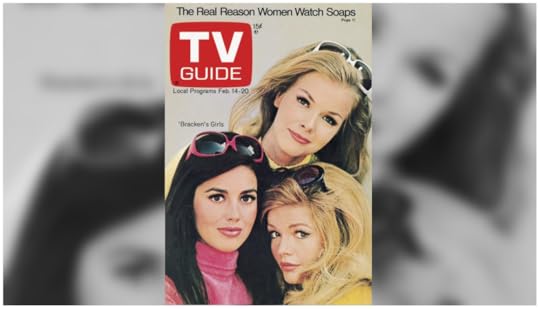
 We're giong to meander a bit this week, flitting from one topic to another with something less than reckless abandon; maybe there's a thread that connects everything—we'll just have to wait until the end and see what we come up with.
We're giong to meander a bit this week, flitting from one topic to another with something less than reckless abandon; maybe there's a thread that connects everything—we'll just have to wait until the end and see what we come up with. But we're going to start by talking about creativity. It seems as if we don't see much creativity in television anymore. I don't mean that there aren't creative programs out there, series that stretch the limits of their genres to places that weren't previously considered. No, I'm talking about the genres themselves; in my memory, I can only think of three really new trends, and even then not all of them are all that "new": the dramedy, a show that's neither fish nor fowl, neither drama nor sitcom; the concept of "story arcs," working in tandem with the increasing serialization of dramatic television; and the miniseries, which functioned as an expansion of a TV-movie to fill several nights, either weekly or consecutively. (There may be more that I've overlooked—in fact, I'd bet on it, so feel free to enlighten me in the comments.*)
*I'm not including "reality" shows in the conversation, other than as an experimental format ( An American Family , for example. There's nothing real about today's reality shows.
 It's too bad, because I think we miss out on programs that could have some real potential. Take, for instance, the rerun showing of Annie, the Women in the Life of a Man (Wednesday, 9:00 p.m. PT, CBS), a collection of 14 comedic, dramatic, and musical vignettes starring Oscar and Tony winner Anne Bancroft and featuring "a star-studded assemblage of gentlemen friends." Each story presents Bancroft in a particular archetype: the "blushing bride," with Dick Shawn as the groom and John McGiver as the father; the "middle-aged neurotic," with Lee J. Cobb as her psychiatrist; the innocent show-biz hopeful, auditioned by David Susskind; and so on. She dances to "Change Partners" with Arthur Murray, is serenaded by Robert Merrill in "Stay," and thinks of her son (Dick Smothers) away at war in "Maman." As the "harried wife," Bancroft dramatizes three poems by Judith Viorst; "The Night Was Made for Love" is a production number with dancers.
It's too bad, because I think we miss out on programs that could have some real potential. Take, for instance, the rerun showing of Annie, the Women in the Life of a Man (Wednesday, 9:00 p.m. PT, CBS), a collection of 14 comedic, dramatic, and musical vignettes starring Oscar and Tony winner Anne Bancroft and featuring "a star-studded assemblage of gentlemen friends." Each story presents Bancroft in a particular archetype: the "blushing bride," with Dick Shawn as the groom and John McGiver as the father; the "middle-aged neurotic," with Lee J. Cobb as her psychiatrist; the innocent show-biz hopeful, auditioned by David Susskind; and so on. She dances to "Change Partners" with Arthur Murray, is serenaded by Robert Merrill in "Stay," and thinks of her son (Dick Smothers) away at war in "Maman." As the "harried wife," Bancroft dramatizes three poems by Judith Viorst; "The Night Was Made for Love" is a production number with dancers.The hour showcases Bancroft's considerable talents, of course, along with a terrific lineup of guests, but what intrigues is that it doesn't fit easily into any conventional format; it's obviously not a one-woman show; the singing and dancing sequences mean it's not a collection of one-act plays; it has a consistent theme—the various roles played by a woman—and a singular star, but other than that it's something new, something different. It most closely resembles a variety special, but even there, with its set dramatic pieces, it's not your typical one. TV Guide's Scott MacDonough calls it "a sparkling parcel of pure pleasure," and includes praise for "the brisk contributions" by the show's writers, including one Mel Brooks, who happens to be Bancroft's husband.
There are plenty of musical-comedy actresses (and actors too, for that matter) who could do something like this today, even though they might not be as talented as Anne Bancroft. Perhaps someone has done something like this recently, or at least in the last few years; I don't know. But in a day when television presented a greater variety of programming that it does today, Annie, the Women in the Life of a Man, was something out of the ordinary, and I think we could do with a bit of that today; at the very least, it beats reboots. Just because Cop Rock was a bomb doesn't mean you don't try again.
Here's a clip of Bancroft performing the Judith Viorst poems, and another of her with Lee J. Cobb. (Is that what David Letterman was thinking of? ) After this show, she'd add an Emmy to her Oscar and Tony. Not bad.
l l l
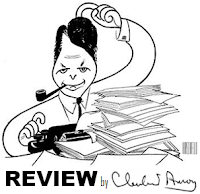 Throughout the 60s and early 70s, TV Guide's weekly reviews were written by the witty and acerbic Cleveland Amory. Whenever we get the chance, we'll look at Cleve's latest take on the shows of the era.
Throughout the 60s and early 70s, TV Guide's weekly reviews were written by the witty and acerbic Cleveland Amory. Whenever we get the chance, we'll look at Cleve's latest take on the shows of the era. Next we have Cleveland Amory's take on a program that was considered one of the most creative children's shows of its time, Sesame Street. At this point in the conversation, the Street has only been open for three months, but Cleve is already comfortable in asserting that Sesame Street "is far and away the greatest children's program that has ever been on the air."
To be on the safe side, Amory took with him, to the screening, a five-year-old friend, "widely known as the terror of kindergarten," and before they sat down to watch, the boy's father suggested Amory notify his next of kin, just in case. No need for concern, though; "Before Sesame Street, the young man's previous attention-span record—clocked in nursery school during the demolition of a blackboard—was 12 seconds. With us, he sat through two hours of Sesame Street—we saw two shows. He loved every minute and, at the end, was still riveted." The real merit of the show lies in how it's so good that children won't even be aware that it's good for them, which must be every parent's dream. It's targeted at inner-city kids, but it's not exclusive to them. And the Muppets tackle the race issue deftly; "The only kids who can identify along racial lines with the Muppets," Jim Henson says, "have to be either green or orange."
Amory singles out several people for praise: Joan Ganz Cooney and her staff, responsible for the show in the first place; and the four human hosts, Gordon, Susan, Bob, and Mr. Hooper. They all have a warmth that draws children to them; they're the kind of people you'd want your own children to know. Other members of Henson's team, including Carroll Spinney and Frank Oz, also come in for mention. I've mentioned before that I came to Sesame Street quite late in life; I was a teenager when I started watching, out of self-defense at the afternoon drivel on the commercial station that broadcast to the World's Worst Town.™. The lessons went over my head (although I can still count to 12 in Spanish), but the interaction between the Muppets, particularly the humor injected to maintain the attention of parents, was and is terrific. (See Exhibit A .) The Children's Television Workshop, and Sesame Street, remain controversial today, but that's not what this is about. Concludes Amory, "We guarantee you will enjoy all of them not just as much as your child but, better still, as a child." Or, I would add, an adult.
l l l
It wouldn't be quite right to segue straight from Sesame Street to soap operas, although I think you'll be entertained when we do get to it, so I'm going to stop off at ABC's Movie of the Week, which presents one of its most unique and unconventional offerings ever: its only non-fiction movie.
 Movie of the Week premiered in September 1969, and over the course of its run (until September 1974) proved to be one of ABC's most popular programs, well-loved by many even today. It introduced pilots for series such as Kung Fu, The Immortal, Alias Smith and Jones, and Longstreet, in addition to movies that stuck in the memory: Duel, Trilogy of Terror, Brian's Song, The Night Stalker and The Night Strangler (neither of which were technically pilots), and That Certain Summer. But somewhere between The Over-the-Hill Gang and How Awful About Allan, it found time to slip in a documentary: The Journey of Robert F. Kennedy (Tuesday, 8:30 p.m.) Produced by David L. Wolper, written by historian and Kennedy intimate Arthur Schlessinger, narrated by John Huston, and with a score by Elmer Bernstein, The Journey of Robert F. Kennedy was part of ABC's effort to address social issues and connect to younger viewers and utilized home movies, news footage, still photos, and interviews. As Michael McKenna says in his Movie of the Week history,
The ABC Movie of the Week: Big Movies for the Small Screen
, "With decades of hindsight, it is difficult not to read the film as an indirect eulogy for the entire decade of the 1960s, and the ideals of many who lived through the era."
Movie of the Week premiered in September 1969, and over the course of its run (until September 1974) proved to be one of ABC's most popular programs, well-loved by many even today. It introduced pilots for series such as Kung Fu, The Immortal, Alias Smith and Jones, and Longstreet, in addition to movies that stuck in the memory: Duel, Trilogy of Terror, Brian's Song, The Night Stalker and The Night Strangler (neither of which were technically pilots), and That Certain Summer. But somewhere between The Over-the-Hill Gang and How Awful About Allan, it found time to slip in a documentary: The Journey of Robert F. Kennedy (Tuesday, 8:30 p.m.) Produced by David L. Wolper, written by historian and Kennedy intimate Arthur Schlessinger, narrated by John Huston, and with a score by Elmer Bernstein, The Journey of Robert F. Kennedy was part of ABC's effort to address social issues and connect to younger viewers and utilized home movies, news footage, still photos, and interviews. As Michael McKenna says in his Movie of the Week history,
The ABC Movie of the Week: Big Movies for the Small Screen
, "With decades of hindsight, it is difficult not to read the film as an indirect eulogy for the entire decade of the 1960s, and the ideals of many who lived through the era." What makes The Journey of Robert F. Kennedy so unusual, to my way of thinking at least, is that it appears within the Movie of the Week format, rather than as an ABC News Special or standalone timeslot; Judith Crist makes an oblique reference to this in her movie reviews, saying it was on "the most serious level" of the week's premieres. Since ABC commissioned Wolper to make it, it's not as if the network had to scramble to find a place for it. It had been less than two years since Kennedy's assassination, and it was a wound that was still open for many people; McKenna's statement that the documentary fit the demographic that ABC sought for the movies seems the most logical answer. Still, I can't remember any instance of a documentary being shown as part of a regular movie series—Saturday Night at the Movies, for example, or The CBS Sunday Night Movies. Docudramas, yes, but not a documentary. The closest you can come is probably something from NET Playhouse in the 1960s. For an original movie of the week, it's a curious, but creative, choice.
l l l
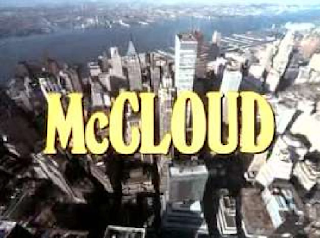 Watching Movie of the Week means missing the first half-hour of NBC's own made-for-TV flick, one that is decidedly not creative, at least in the sense that we've seen the fish-out-of-water plot play out many times over the years. This one works, though—it's McCloud (Tuesday, 9:00 p.m.), the origin story for the series of the same name, starring Dennis Weaver as Marshal Sam McCloud, who's come all the way from New Mexico to the big city, i.e. the Big Apple, escorting a prisoner who winds up being kidnapped, with McCloud winding up entangled in a murder investigation. He's joined by Mark Richman as Chief Clifford (who'd be played in the series by J.D. Cannon), and Terry Carter as Sgt. Broadhurst; he'd continue in the role for the entirety of the series.
Watching Movie of the Week means missing the first half-hour of NBC's own made-for-TV flick, one that is decidedly not creative, at least in the sense that we've seen the fish-out-of-water plot play out many times over the years. This one works, though—it's McCloud (Tuesday, 9:00 p.m.), the origin story for the series of the same name, starring Dennis Weaver as Marshal Sam McCloud, who's come all the way from New Mexico to the big city, i.e. the Big Apple, escorting a prisoner who winds up being kidnapped, with McCloud winding up entangled in a murder investigation. He's joined by Mark Richman as Chief Clifford (who'd be played in the series by J.D. Cannon), and Terry Carter as Sgt. Broadhurst; he'd continue in the role for the entirety of the series.McCloud was unavailable for preview, which means Judith Crist doesn't review it, but its success causes it to appear in the network's fall schedule, as part of its Four in One wheel series. For season two, it moves to the NBC Mystery Movie series, where it remains for six additional seasons. There are only 45 episodes in total; for all its popularity, it never becomes a weekly series—but then, neither does Columbo, which just goes to show that sometimes being creative just means doing things a little differently.
l l l
One of early television's most creative programs was Burr Tillstrom's Kukla, Fran and Ollie, the beloved children's puppet show (with hostess Fran Allison) that, not unlike Sesame Street, attracted an adult audience as well; among the more famous fans of the Kuklapolitans were Thornton Wilder, Richard Rodgers, Ruth Gordon, Orson Welles, Tallulah Bankhead, Kurt Weill, Lillian Gish, and John Steinbeck. After many years away, Kukla, Fran and Ollie returns to television this month, with five weekly half-hour specials on 167 NET stations, beginning February 4 (episode 3 airs Wednesday at 8:00 p.m.). The story of the show's rise and fall, as told by Dwight Whitney, is a classic case of how television has failed in one of its essential missions: to provide programming that is intelligent, entertaining, and educational to children, regardless of commercial success.
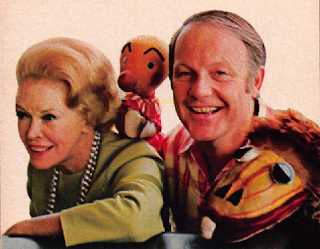 Kukla began on Chicago television in 1947 before moving to NBC the following year (airing daily at 6:00 p.m. Central), and soon built up its impressive following with a half-hour "in which children ceased their play automatically, and mother's only problem was to avoid being crushed in the rush to the television set." It was anything but a typical show; as Whitney notes, Tillstrom "broke all the rules." There was no script—each episode ran on what Whitney calls "a stream-of-consciousness-type 'inner dialogue' " between Fran and Tillstrom, who played all the puppet voices. There was no extravagant staging, just a simple puppet stage. The show's humor was low key and smart, with occasional performances of the classics, such as their famous
production of "The Mikado"
by the "Kuklapolitan Art Theatre and Light Opera Group." And while audiences might not have been huge, they loved the show; when it was cut from 30 to 15 minutes in 1951, the network was swamped with protests, even though the remainder of the half-hour was filled by The Bob & Ray Show, a show whose dry comic tone actually complimented Kukla's).
Kukla began on Chicago television in 1947 before moving to NBC the following year (airing daily at 6:00 p.m. Central), and soon built up its impressive following with a half-hour "in which children ceased their play automatically, and mother's only problem was to avoid being crushed in the rush to the television set." It was anything but a typical show; as Whitney notes, Tillstrom "broke all the rules." There was no script—each episode ran on what Whitney calls "a stream-of-consciousness-type 'inner dialogue' " between Fran and Tillstrom, who played all the puppet voices. There was no extravagant staging, just a simple puppet stage. The show's humor was low key and smart, with occasional performances of the classics, such as their famous
production of "The Mikado"
by the "Kuklapolitan Art Theatre and Light Opera Group." And while audiences might not have been huge, they loved the show; when it was cut from 30 to 15 minutes in 1951, the network was swamped with protests, even though the remainder of the half-hour was filled by The Bob & Ray Show, a show whose dry comic tone actually complimented Kukla's).What eventually did in Kukla, Fran and Ollie was television's evolution to a ratings-based system. Pat Weaver, who was NBC's programming chief at the time, recalls that "Burr's history was one of great charm and style, not boffo humor. He was not massively successful in the ratings." Adds David Levy, former VP of programming at the network, "I think he was the victim of a TV structure that had to reach the greatest number of people irrespective of specialized program content. It went off for the same reason Playhouse 90, Studio One and The Voice of Firestone did. These specialized programs [worked] in the early days because it was not yet necessary to reach the tremendous masses." He then adds the coup de grace: "It may have been too good." Says Newton "Vast Wasteland" Minow, Tillstrom's friend and longtime attorney, "Anything on TV a long, long time seems to require replacement. I think that's wrong, especially in children's programming." NBC let the contract lapse in 1954. ABC, which picked up the show, lost interest in 1957; and, until now, that was that.
Tillstrom is pleased to be back on TV, working with NET; it's revived interest in the Kuklapolitans, and in December they appeared on The Hollywood Palace . He's also pleased for the success of Sesame Street as well. But he hasn't forgotten the experience of being on television; "I asked myself who in his right mind would go back into television anymore—except to make a bundle?" He says he doesn't need the money, that the only important thing is to "do my thing," but he adds, "Not that I don't like to be paid, but it’s all economics! Take the Money and Run! Ugh! The real question is what can we do for people? Then I thought maybe that question will come back into fashion again. After all, we are talking about the most powerful communications force the world has ever known." It's 63 years later, and we're still asking that question.
l l l
I suppose I'm contractually obligated to take a look at what else is on this week, so here we go.
 Mr. Magoo is back this week, in an animated hour-long special, Uncle Sam Magoo, that takes a look at American history (Sunday, 6:30 p.m., NBC), with everyone's favorite nearsighted character as our guide. Magoo, you've done it again! Wisely, CBS waits until Magoo is over for it's own animated special, a rerun of He's Your Dog, Charlie Brown (Sunday, 7:30 p.m.) Like so many of the non-holiday Peanuts specials, this one just doesn't have the staying power of the rest. And although The Hollywood Palace left the airwaves last week, that won't stop us from checking out the guest cast on The Ed Sullivan Show (Sunday, 8:00 p.m., CBS): Michael Parks of Then Came Bronson; six-state heavyweight champ Joe Frazier (who fights for the world title tomorrow night)*; the Supremes, making their first TV appearance without Diana Ross; Arte Johnson of Laugh-In; actress-singer Michele Lee; and comic Robert Klein.
Mr. Magoo is back this week, in an animated hour-long special, Uncle Sam Magoo, that takes a look at American history (Sunday, 6:30 p.m., NBC), with everyone's favorite nearsighted character as our guide. Magoo, you've done it again! Wisely, CBS waits until Magoo is over for it's own animated special, a rerun of He's Your Dog, Charlie Brown (Sunday, 7:30 p.m.) Like so many of the non-holiday Peanuts specials, this one just doesn't have the staying power of the rest. And although The Hollywood Palace left the airwaves last week, that won't stop us from checking out the guest cast on The Ed Sullivan Show (Sunday, 8:00 p.m., CBS): Michael Parks of Then Came Bronson; six-state heavyweight champ Joe Frazier (who fights for the world title tomorrow night)*; the Supremes, making their first TV appearance without Diana Ross; Arte Johnson of Laugh-In; actress-singer Michele Lee; and comic Robert Klein.*Muhammad Ali had been stripped of his title due to draft evasion; a tournament was held to select his successor, and was won by Jimmy Ellis. Frazier declined to participate in the tournament, feeling Ali should not have had his title taken away; he defeated Buster Mathis, and was recognized as champion by the boxing commissions in six states, including—most importantly—New York State. Frazier's fight tomorrow is a unification bout against Ellis; Frazier dominates the fight, which is stopped after the fourth round, and becomes undisputed heavyweight champion.
NBC presents a pair of specials Monday night, beginning with a Bob Hope benefit for the Eisenhower Medical Center in California (9:00 p.m.); a star-studded audience, including Mrs. Mamie Eisenhower; astronauts Neil Armstrong, Frank Borman and Walter Schirra; Terence Cardinal Cooke; Gov. and Mrs. Nelson Rockefeller; and 11 Medal of Honor winners, gather in the grand ballroom of the Waldorf-Astoria Hotel in New York City to be entertained by Bob, Bing Crosby, Ray Bolger, Johnny Cash, and Raquel Welch. That's followed at 10:00 by The Return of the Smothers Brothers, with Peter Fonda, Glen Campbell, David Frye, David Steinberg, and Bob Einstein. Pat Paulsen is on hand as well, and Fredd Wayne plays his trademark role of Benjamin Franklin in a bit that includes Paulsen as Abe Lincoln and Frye as LBJ.
On Tuesday, Jackie Gleason sits down for a rare television interview with David Frost (8:00 p.m., syndicated), in which he talks about men and women (men have mother complexes, and you can't lie to women); love (it means giving); comedy (comedians have to be good actors, as indeed Gleason was); success (you have to hurt somebody to get it); the occult ("there is absolute proof that ESP exists); and happiness ("How can you be happy when people are dying in Vietnam?"). And on Friday, the KOVR late movie is Stranger on the Run (11:30 p.m.), with Henry Fonda, Anne Baxter, and Then Came Bronson's Michael Parks. I wonder if he's the one on the run?
l l l
Finally, that soap opera article I promised you. It's written by James Lipton—yes, the James Lipton of Inside the Actor's Studio. As many of you probably know, he was quite the renaissance man: actor, writer, producer, and even lyricist. (I always thought that if What's My Line was ever brought back in its old format, with tuxedos and everyone being called mister or miss, he would have been an ideal host.) He wrote for The Edge of Night and The Doctors, and was the head writer for Another World, The Best of Everything (which he also created), Return to Peyton Place, and Capitol, so if anyone's equipped to talk about soaps, it's him. And he's here, in a very long but interesting article, to defend the soap as legitimate.
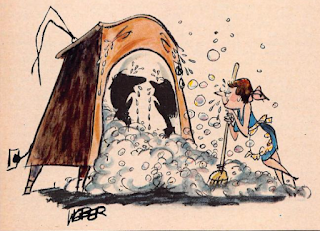 After all, he points out, 20 percent of network revenue comes from daytime television. And daytime means the soap opera, since nine of the top ten most popular daytime shows are soapers. So why are they so popular? Because of the hold they have on their viewers. "Compared with the daytime audience, nighttime viewers are bored, dispassionate and fickle." Nobody calls the station because the Western heroine has been tied to the tracks, but "when I was writing a daytime serial, the mere hint that a scheduled wedding might not take place brought floods of nervous calls, not just to the stations but to the program's production office in New York."
After all, he points out, 20 percent of network revenue comes from daytime television. And daytime means the soap opera, since nine of the top ten most popular daytime shows are soapers. So why are they so popular? Because of the hold they have on their viewers. "Compared with the daytime audience, nighttime viewers are bored, dispassionate and fickle." Nobody calls the station because the Western heroine has been tied to the tracks, but "when I was writing a daytime serial, the mere hint that a scheduled wedding might not take place brought floods of nervous calls, not just to the stations but to the program's production office in New York."Lipton discusses and dismisses one theory for their popularity: that "it takes place in the intimacy of their living rooms," just like the viewer's own life does. But then, so do many nighttime shows, and their fans don't react the same way. (Unless they're Trekkers.) His own belief is that it's because soap operas are real. "This must sound like an extraordinary, even a reckless, claim in the face of the customary criticism of the soaps: that they are bathetic, sentimental and trapped in a morality that could have made Queen Victoria beam." But let's go back to that joke I told a moment ago about the heroine tied to the railroad tracks. The difference, Lipton asserts, is that there's no suspense about her being rescued; "no matter what jeopardy threatens his heroes and heroines, [the viewer] knows that, one way or another, they'll survive. How does he know? Simple. They're already scheduled for a return next week, same time, same station; a glance at the pages of this very magazine will assuage whatever fears the program may have aroused."
On the other hand, when a soap's characters are put in jeopardy, "they may just die—and the viewer knows it." Our threats aren't the same as the nighttime hero faces; nobody living a regular life faces those kinds of obstacles. But our world is much like that of the soap opera; "Our cancers really kill, and childbirth has all the hazards of the real even. If our heroines sip coffee and worry about their children or their love affairs or the fidelity of their husbands, it is because our viewers sip coffee and worry about their children or their love affairs or the fidelity of their husbands." Soap operas are domestic drama, "but we are, in large part, a domestic society."
As for the accusations that soaps are second-class productions, he asks us to remember that they're either broadcast live (some still were, even in 1970) or recorded life on tape; their flaws and fluffs are no different than those from Studio One and Playhouse 90. This excitement, in turn, is attracting an increasing number of first-rate writers; Lipton himself, in addition to writing soaps, has authored the best-selling book An Exaltation of Larks . and he says this not to toot his own horn (although that, too), but because it demonstrates how serious writers are being drawn to work for soaps. As we've seen, the theme today has been creativity, and according to Lipton, the most creative writers are working in perhaps the most creative genre, soaps.
The bottom line is that those who criticize soap operas probably haven't seen them for awhile. Their audience is a discerning one; "When I was playing Dr. Grant on The Guiding Light, the three most loyal and vocal fans I had were Lena Horne, Cole Porter and Tallulah Bankhead; I wouldn’t call them undiscerning." And when he has an itch to create contemporary drama, it's the soap opera to which he turns. It's an interesting argument he makes; I'm not sure I agree with all of it; I never was a fan of them, and there aren't many left on TV, but when I've been in doctor's waiting rooms where one has been on, I've noticed an awful lot of sex and skin, with people who are almost uniformly beautiful and handsome. Now, maybe this is a reflection of the People magazine type of culture we've become rather than what it really is, but with plastic surgery as popular as ever, maybe not. I'm sure books have been written on this topic, and perhaps some of you have your own opinions. But, based on what Lipton writes here, either my respect for the soap opera is increasing, or my respect for popular culture is decreasing. TV
Published on February 11, 2023 05:00
February 10, 2023
Around the dial
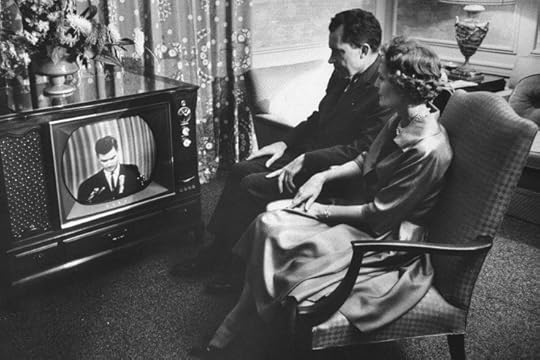
 We'll start the week off at bare-bones e-zine, where Jack has an entertaining look at Harlan Ellison's only contribution to the Alfred Hitchcock oeuvre: the tenth-season episode "
Memo From Purgatory
, based on his own non-fiction story of life in a street gang, with the young James Caan as Ellison.
We'll start the week off at bare-bones e-zine, where Jack has an entertaining look at Harlan Ellison's only contribution to the Alfred Hitchcock oeuvre: the tenth-season episode "
Memo From Purgatory
, based on his own non-fiction story of life in a street gang, with the young James Caan as Ellison.If you've been following along the last few weeks at Cult TV Blog you've seen John look at The Prisoner as a series of episodes paired together into feature-length films . Having run through the possibilities, John arrives with his conclusions as to just how successful the experiment might have been.
At Comfort TV, David continues his quest through 1970s TV, attempting to watch one episode of every 1970s series, and we're now up to Thursday, 1971 . A collection of interesting shows, some better and longer-lasting than others, but none of them as cool as The Dean Martin Show.
It can be hard to envision Jack Webb as anyone other than Joe Friday, but the Dragnet star could be found on old-time radio in other roles; this week, Martin Grams looks at one of them, Pete Kelly's Blues, in which Webb plays a jazz musician who solves crimes on the sleazy side of the street. The scripts of the 13 programs in the series have now been collected into a book—read all about it.
Finally, I've often lamented the loss of the traditional late-night talk show which was built around conversation rather than, you know, self-serving plugs by ersatz celebrities. Herbie J. Pilato revisits those days, and how they provided "decades of entertainment and information with class, sophistication, and elegance." TV
Published on February 10, 2023 05:00
February 8, 2023
The long and the short of it

 A while back, I was reading a thread—I think it was on Twitter—that asked a simple question: Would you start watching a show knowing that it was had already been cancelled? I was particularly interested in someone who replied that, sure, if there was a final episode that provided a resolution, they'd watch, but if the series ended without a resolution, they wouldn't even start. (Coronet Blue would, I suppose, be the preeminent example of the kind of show they're talking about, although that didn't prevent it from becoming a cult classic.)
A while back, I was reading a thread—I think it was on Twitter—that asked a simple question: Would you start watching a show knowing that it was had already been cancelled? I was particularly interested in someone who replied that, sure, if there was a final episode that provided a resolution, they'd watch, but if the series ended without a resolution, they wouldn't even start. (Coronet Blue would, I suppose, be the preeminent example of the kind of show they're talking about, although that didn't prevent it from becoming a cult classic.)What interests me the most about this conversation is that it highlights how much television watching has changed over the decades. Many people today never knew, or don't remember, the days when most television series consisted of self-contained episodes, with stories that began and ended within the episode. If the story was really big, it might rate a two-parter, or in rare cases even a three-parter, but that was about it. No, today's television viewers are used to a series that is essentially one very long episode with a story that begins with the first episode and ends with the last episode, at which time the question which has been with us since the beginning comes to a resolution. Of course, real life often isn't quite that neat; there are many, many things over the course of a lifetime that are never resolved or are so inconsequential (a meal is cooked and consumed, the dishes are cleaned and put away) that they would never work as a series-long story arc. Our modern-day desire for "closure" can result in a great deal of frustration, because that's not the way life is.
Although it wasn't the first series to have a final episode, when it comes to wrapping up the storyline, most people think of The Fugitive, and Dr. Richard Kimble's elusive search for the one-armed man who had killed his wife, while he in turn is being hunted by Lieutenant Gerard, the man who wants to return him to death row. You'd think that perhaps the ending to this saga had been written at the very outset, but it hadn't; in fact, Quinn Martin had to be talked into providing an end for the series. He feared that doing so would damage the show's prospects in syndication—who would want to watch it when they already knew how it would end? This is precisely the opposite way of thinking from that which we saw in that Twitter thread, but times change.
(By the way, one of the things that made The Fugitive's final episode unique was that it came not at the end of the first-run cycle of episodes, in May or June, but in August, after the rerun season had concluded. The final episode of The Fugitive was, in fact, the final episode, and it was an extraordinary way to end the series. And it happened because Quinn Martin needed to be convinced to do it, which meant a conventional airing date of May/June wasn’t possible, and the network decided to go with the next best thing. Still, you have to admit that even if it was accidental, it was a stroke of genius, a felix culpa.)
l l l
In replacing episodic television with increased serialization, it's sometimes said that the new way of looking at things is more realistic, allowing for an opportunity to explore the story in more depth, more detail. Now, I'll grant that the traditional episodic form of a series such as, let's say, Perry Mason, can leave something to be desired; an attorney who specializes in trial law can hardly be expected to try 30+ cases a year. We didn't really think about that, though; we relied on being entertained for one hour each week by Perry and his latest case and didn't try to fit it all into some larger puzzle. (Hopefully, Peacock's new hit Poker Face can help revive, at least in some cases, the idea of contained episodic television.)
A series like this didn't need a final episode, because there was no overarching theme that required resolution. It was just a series of snapshots of a very successful attorney's life, and if you were willing to overlook the flaws inherent in the construction of said series, it was a template that could be applied to the lives of most of us; life was simpler back then. As I said, real life isn't nearly as neat as television can make it out to be. In that way, Coronet Blue was probably more realistic than we'd like to admit; Michael Alden didn't have any guarantee that he'd ever figure out what "Coronet Blue" meant, any more than Dr. Kimble was guaranteed he'd find the one-armed man. By being more realistic, television can also be less realistic, and if you can figure that out, then you're way ahead of the game. Life also isn't always lived on an epic scale; I'm nearly 63 and I'm still waiting to figure out what my storyline is.
One of the other trademarks of the new television (if we can call it that) is the shorter number of episodes in a season. Back in the day, the average television season for a series could consist of anywhere between 28 and 39 episodes; today, somewhere between ten and 12 is more likely. Thanks to the miracles of modern technology, viewers can binge-watch an entire season over a weekend, and can catch up on a long-running series over a few weeks. This makes sense on a couple of levels; if your series is going to tell a unified story that has a beginning, a middle, and an end, you've got to make it digestible for the viewer. Watching the whole season in two or three days makes the story more cohesive, easier to remember and follow, without the writers having to spend time recapping the story or using clumsy techniques to remind us of what's going on.
It's also said that writing and production quality can be higher when resources don't have to be stretched as far as they did over the course of a long season, and it's probably easier to get big-name stars to commit to longer arcs that it used to be (although one of the pleasures of the classic era was in seeing a big-name star appearing in a one-off guest spot, and in the age of the self-contained episode that was usually good enough). In the pre-VCR era, the reruns gave you the chance to catch up on what you might have missed during the regular season, which made the 52-week season practical in more ways than one—it kept the show foremost in the mind of the viewers, keeping them poised for the show’s return during the always exciting Premiere Week in September.
l l l
But let's go back to The Fugitive for a minute. There were 120 one-hour episodes of The Fugitive 4(an average of 30 per season), and but through the course of those 118 stories that led up to the final two-parter, a tremendous amount of suspense built up. Yes, we knew that our hero would escape the clutches of Lieutenant Gerard, or whatever ham-fisted local policeman happened to have Kimble in his sites, but that didn’t prevent the viewer from experiencing the sense that Kimble was on a type of epic journey, an Odyssey if you will, crisscrossing the country in search of a goal so elusive that it was only the occasional glimpse of the one-armed man that convinced Kimble it wasn’t all just a dream. The Harrison Ford big-screen version of The Fugitive was swell and all, terrific on its own terms, but it all happened just too fast; it lacked that sense of ordeal that Kimble had suffered. If The Fugitive were made today, I wonder; could this sense of time and journey, could the epic nature of it all, have been done in just 30 or 40 episodes?
Maybe it could—The Prisoner ran for just 17 episodes, after all, and yet created one of the most bizarre worlds television has ever seen, one that left viewers and actors alike utterly exhausted when it was done. Had the series lasted longer than it did, I’m not sure anyone could have stood it. For it to have come back for a second season would have been ridiculous. There’s a key difference, though, one that might help answer the question, at least in part. Number 6 (or John Drake, if you prefer) was never someone we actually were supposed to know; it was the enigmatic quality of the show that made it work in the first place. The Fugitive, on the other hand, succeeded precisely because of our ability to know and trust Kimble, to believe that he was innocent of his wife’s murder, and to put our rooting interest in his escape from authority. Therefore, while brevity was an asset to The Prisoner, familiarity was essential to The Fugitive.
So there are the requirements for today's successful television series: it needs to tell a serialized story with a beginning and end, and it will probably run for about a dozen episodes. In that respect, modern television most closely resembles the old miniseries, a genre that was hugely popular but, at its peak, ruled for a relatively short period of time. The original concept of the miniseries was to tell a story in an epic amount of detail, far more than could be handled in a traditional movie (even a three-hour or two-part movie), but a story that nonetheless fell short of filling the space necessary to occupy a multiseason series. Rich Man, Poor Man was a huge success at 12 episodes of varying lengths (the sequel was somewhat less successful, possibly because it was written entirely for television); Roots, at eight consecutive nights, was a success beyond all expectation and triggered an avalanche of miniseries, from Shogun to Holocaust to The Winds of War and the incredibly ambitious War and Remembrance. What these all had in common was that they had literary sources, were of limited duration, and told stories that had finite endings.
Today's modern series, with the beginning, middle, and end, have copied the MO of the miniseries, but with the advantage that they’ve not limited to one six- or eight-week season, but can keep coming back for years and years. The drawback to this, as anyone who’s read the original source material for shows such as, say, Game of Thrones, is that the book generally runs out of material before the series runs out of time (or, in the case of GOT, isn't even written yet).
l l l
You could call this the long and the short of the new television: longer storytelling, stretched over an entire series; and shorter seasons, designed to be compatible with the new storytelling.
What we’re missing, I think, is a commitment to our favorite show as viewers, and a concurrent commitment by those shows to us. There was something comforting to being provided with a guaranteed hour of entertainment at the same time every week all year long, save an interruption or two for specials or something unexpected. Yes, as I said at the outset, not all of them were winners, but a lot of them were pretty good, and most of them were at least entertaining. At the end, they usually gave you what they wanted, which was all we usually asked from our shows. The summer season, when some of the series went off the air to give prospective new series a tryout, was what brought shows like The Prisoner to American television in the first place.
Sometimes I think too many television shows today try to operate on too grand a scale, as if every episode was the second act of Tosca, where the diva gets to sing the show-stopping aria before plunging the dagger into the chest of the villain, thus setting the stage for the grand finale. That kind of emotion is unsustainable over a protracted season, one reason for the truncated seasons. But not every series needs to be Tosca; sometimes it's enough to simply provide, as my friend David Hofstede calls it, Comfort TV. We burn through a season a weekend and look for more, we catch up on a decade's worth in a month, we text and talk and our attention spans grow ever shorter, and then we wonder why our comfort turns to indigestion. TV
Published on February 08, 2023 05:00
February 6, 2023
What's on TV? Sunday, February 2, 1969

 How many of you, besides Mike Doran, remember My Friend Tony? (10:00 p.m., NBC) I must confess that, until I saw a few episodes of it pop up on YouTube last year, I had never heard of it. No memory whatsoever, not even of having run across it in Brooks and Marsh's Complete Guide to Prime Time Network TV Shows, and I used to browse through that just for fun; I can assure you that doesn't happen very often. At any rate, James Whitmore stars as John Woodruff, a criminologist assisted by Tony, who was a street urchin in Italy during WW2 (where he met Woodruff while trying to pick his pocket) and later emigrated to America. Sixteen episodes; I watched a few minutes of it last month and was not impressed. But hopefully you'll be impressed by the rest of this lineup from the Northern California edition.
How many of you, besides Mike Doran, remember My Friend Tony? (10:00 p.m., NBC) I must confess that, until I saw a few episodes of it pop up on YouTube last year, I had never heard of it. No memory whatsoever, not even of having run across it in Brooks and Marsh's Complete Guide to Prime Time Network TV Shows, and I used to browse through that just for fun; I can assure you that doesn't happen very often. At any rate, James Whitmore stars as John Woodruff, a criminologist assisted by Tony, who was a street urchin in Italy during WW2 (where he met Woodruff while trying to pick his pocket) and later emigrated to America. Sixteen episodes; I watched a few minutes of it last month and was not impressed. But hopefully you'll be impressed by the rest of this lineup from the Northern California edition.-2- KTVU (BAY AREA) (IND.) Morning 8:25 NEWS COLOR 8:30 INSIGHT—Drama COLOR 9:00 DIALOGUE COLOR 9:30 EDITOR’S FORUM COLOR 10:00 DOCTOR’S NEWS CONFERENCE COLOR 10:30 MOVIE—Western COLOR “Massacre at Fort Perdition” (1966) Afternoon 12:00 LAUREL AND HARDY—Comedy 1:00 JOE FOSS COLOR 1:30 KINGDOM OF THE SEA COLOR 2:00 MOVIE—Comedy “Here Comes Mr. Jordan” (1941) 4:00 MOVIE—Comedy “Touch and Go” (English; 1955) 5:30 COLLEGE TALENT COLOR Evening 6:00 12 O’CLOCK HIGH—Drama 7:00 MOVIE—Western “The Indian Fighter” (1955) 9:00 DAVID SUSSKIND COLOR 11:00 JOE PYNE—Discussion COLOR
-3- KCRA (SACRAMENTO) (NBC) Morning 7:30 CHRISTOPHERS COLOR 7:45 SACRED HEART COLOR 8:00 NEGRO/AMERICAN CULTURE—Education COLOR 8:30 THIS IS THE LIFE COLOR 9:00 MOVIE—Drama COLOR “Courage of Black Beauty” (1957) 10:30 GUIDELINE COLOR 11:00 TREASURE 11:30 HEART OF THE PROBLEM COLOR Afternoon 12:00 CALIFORNIA U.S.A. COLOR 12:30 CHAMPIONSHIP BOWLING COLOR 1:00 MEET THE PRESS COLOR 1:30 NEWS 2:00 COLLEGE BOWL COLOR Swathmore vs. Cornell 2:30 WILD KINGDOM COLOR 3:00 MOVIE—Western “The Silver Whip” (1953) 4:30 SKIPPY—Western COLOR 5:00 ADVENTURES OF HUCK FINN COLOR 5:30 MOVIE—Drama “The Frogmen” (1951) Evening 7:30 WALT DISNEY COLOR “Pancho, the Fastest Paw in the West” 8:30 MOTHERS-IN-LAW—Comedy COLOR 9:00 BONANZA COLOR 10:00 MY FRIEND TONY COLOR 11:00 NEWS COLOR 11:30 JOHNNY CARSON COLOR
-4- KRON (BAY AREA) (NBC) Morning 6:30 PROFILE COLOR 7:00 CARTOONS COLOR 8:00 AGRICULTURE U.S.A. COLOR 8:30 HERITAGE COLOR 9:00 MOVIE—Drama “Stakeout on Dope Street” (1958) 10:30 GUIDELINE COLOR 11:00 RAWHIDE—Western Afternoon 12:00 GREEN THUMB COLOR 12:30 COMMUNITY CIRCLE FILM COLOR 1:00 MEET THE PRESS COLOR 1:30 MOVIE—Western “The Capture” (1950) 3:00 ROUTE 66 4:00 SPEAK OUT COLOR 4:30 YOUTH INQUIRES COLOR 5:00 COLLEGE BOWL COLOR Swathmore vs. Cornell 5:30 FRANK McGEE COLOR Evening 6:00 NEWS—Phil Wilson COLOR 6:30 WILD KINGDOM COLOR 7:00 ADVENTURES OF HUCK FINN COLOR 7:30 WALT DISNEY COLOR “Pancho, the Fastest Paw in the West” 8:30 MOTHERS-IN-LAW—Comedy COLOR 9:00 BONANZA COLOR 10:00 MY FRIEND TONY COLOR 11:00 NEWS COLOR 11:30 JOHNNY CARSON COLOR 1:00 NEWS COLOR
-5- KPIX (BAY AREA) (CBS) Morning 6:00 THE ANSWER—Religion COLOR 6:30 BIG PICTURE—Army COLOR 7:00 INTERNATIONAL ZONE—UN COLOR 7:30 MEDICINE—Education 8:00 LAMP UNTO MY FEET COLOR 8:30 LOOK UP AND LIVE COLOR 9:00 ENCOUNTER—Interview 9:30 FOREST RANGERS 10:00 CAMERA THREE COLOR 10:30 NEWSMAKER ’69 COLOR 11:00 KPIX SPORTS 11:30 PRO HOCKEY COLOR Montreal Canadiens at Chicago Black Hawks Afternoon 2:00 CHILDREN’S FILMS “Skinny and Fatty” (1959) 3:00 POW!—John Wasserman 4:00 TO BE ANNOUNCED 4:30 FACE THE NATION COLOR 5:00 PERRY MASON—Mystery Evening 6:00 NEWS—Magers, Tompkins COLOR 6:30 MARSHAL DILLON—Western 7:00 GILBERT AND SULLIVAN SPECIAL COLOR “The Mikado” 8:00 ED SULLIVAN COLOR Guests: Sergio Franchi, Vikki Carr, Vanilla Fudge, the Temptations, Stiller and Meara, Jacques d’Amboise, the Antoinettes 9:00 SMOTHERS BROTHERS COLOR Guests: Burl Ives, Jackie Cain, Roy Kral, the Chambers Brothers, Leigh French 10:00 MISSION: IMPOSSIBLE COLOR 11:00 NEWS COLOR 11:30 NEWS—Harry Reasoner COLOR 11:45 MOVIE—Comedy “The Belles of St. Trinian’s” (English; 1954)
-6- KVIE (SACRAMENTO) (EDUC.) Afternoon 3:30 SPEAKING FREELY COLOR Anthony Quinn 4:30 SCIENCE REVIEW 5:30 FRENCH CHEF—Cooking Crepes suzette Evening 6:00 REAL REVOLUTION—Talk 6:30 INNOVATIONS 7:00 WILLIAM F. BUCKLEY JR. COLOR Guests: Cleveland Amory, Barnaby Conrad 8:00 PBL—Report COLOR Generation of Pawns: the Urban School Crisis 9:30 CLAIRE BOOTH LUCE DEBUT COLOR 10:00 NET FESTIVAL—Report
-7- KGO (BAY AREA) (ABC) Morning 7:00 BROTHER BUZZ COLOR 7:30 THE ANSWER—Religion COLOR 8:00 HELP—Religion COLOR 8:30 BEATLES—Children COLOR 9:00 LINUS—Children COLOR 9:30 KING KONG COLOR 10:00 BULLWINKLE COLOR 10:30 ISSUES AND ANSWERS COLOR Tentatively scheduled: Sen. Majority Leader Mike Mansfield (D-Mont.) 10:55 PRO BAKETBALL COLOR New York Knicks at Boston Celtics Afternoon 1:00 DIRECTIONS COLOR 1:30 DISCOVERY—Children COLOR 2:00 ANDY WILLIAMS GOLF SPECIAL COLOR Andy Williams San Diego Open, Final Round Regular programming is pre-empted 4:00 AMERICAN SPORTSMAN COLOR 5:00 MOVIE—Drama “Betrayed” (1954) Evening 6:30 WILD KINGDOM COLOR 7:00 LAND OF THE GIANTS COLOR 8:00 FBI COLOR 9:00 MOVIE—Adventure COLOR “Sands of the Kalahari” (English; 1965) 11:00 NEWS COLOR 11:15 NEWS—Grimsby 11:30 MOVIE—Western COLOR “Pony Soldier” (1952)
7 KRCR (REDDING) (ABC, NBC) Morning 7:30 FAITH FOR TODAY COLOR 8:00 CATHEDRAL OF TOMORROW—Religion COLOR 9:00 LINUS—Children COLOR 9:30 KING KONG COLOR 10:00 BULLWINKLE COLOR 10:30 ISSUES AND ANSWERS COLOR Tentatively scheduled: Sen. Majority Leader Mike Mansfield (D-Mont.) 10:55 PRO BAKETBALL COLOR New York Knicks at Boston Celtics Afternoon 1:00 DIRECTIONS COLOR 1:30 DISCOVERY—Children COLOR 2:00 ANDY WILLIAMS GOLF SPECIAL COLOR Andy Williams San Diego Open, Final Round Regular programming is pre-empted 4:00 AMERICAN SPORTSMAN COLOR 5:00 MOVIE—Drama “Mystery Submarine" (1950) Evening 7:00 WILL SONNETT COLOR 7:30 WALT DISNEY COLOR “Pancho, the Fastest Paw in the West” 8:30 BEWITCHED—Comedy COLOR 9:00 BONANZA COLOR 10:00 OUTCASTS—Western COLOR 11:00 GREATEST SHOW COLOR 12:00 NEWS COLOR
9 KIXE (REDDING) (NET) Afternoon 3:30 SPEAKING FREELY COLOR Anthony Quinn 4:30 SCIENCE REVIEW 5:30 FRENCH CHEF—Cooking Crepes suzette Evening 6:00 SMART SEWING—Education 6:30 INNOVATIONS 7:00 WILLIAM F. BUCKLEY JR. COLOR Guests: Cleveland Amory, Barnaby Conrad 8:00 PBL—Report COLOR “Generation of Pawns: the Urban School Crisis” 9:30 CLAIRE BOOTH LUCE DEBUT 10:00 NET FESTIVAL—Report
10 KXTV (SACRAMENTO) (CBS) Morning 6:30 HERALD OF TRUTH COLOR 7:00 THE ANSWER—Religion 7:30 SACRED HEART COLOR 7:45 LIFT EVERY VOICE COLOR 8:00 LAMP UNTO MY FEET COLOR 8:30 LOOK UP AND LIVE COLOR 9:00 TOM AND JERRY COLOR 9:30 CALENDAR COLOR 10:00 CAMERA THREE COLOR 10:30 CHILDREN’S FILM FESTIVAL RETURN COLOR 11:30 PRO HOCKEY COLOR Montreal Canadiens at Chicago Black Hawks Afternoon 2:00 1965 INDIANAPOLIS 500 COLOR 2:30 JEAN-CLAUDE KILLY COLOR 3:00 GADDABOUT GADDIS COLOR 3:30 CBS GOLF CLASSIC COLOR Gardner Dickinson and Sam Snead vs. Tom Weiskopf and Tony Jacklin 4:30 McHALE’S NAVY—Comedy 5:00 MOVIE—Comedy “40 Pounds of Trouble” (1962) Evening 7:00 LASSIE COLOR 7:30 GENTLE BEN COLOR 8:00 ED SULLIVAN COLOR Guests: Sergio Franchi, Vikki Carr, Vanilla Fudge, the Temptations, Stiller and Meara, Jacques d’Amboise, the Antoinettes 9:00 SMOTHERS BROTHERS COLOR Guests: Burl Ives, Jackie Cain, Roy Kral, the Chambers Brothers, Leigh French 10:00 MISSION: IMPOSSIBLE COLOR 11:00 NEWS COLOR 11:15 NEWS COLOR 11:30 MOVIE—Drama ‘Mildred Pierce” (1945)
12 KHSL (CHICO) (CBS) Morning 8:30 ALLEN REVIVAL—Religion 9:00 HERALD OF TRUTH COLOR 9:30 UNDERDOG—Children COLOR 10:00 CAMERA THREE COLOR 10:30 FACE THE NATION COLOR 11:00 CARTOONS COLOR 11:30 PRO HOCKEY COLOR Montreal Canadiens at Chicago Black Hawks Afternoon 2:00 CHILDREN’S FILMS “Skinny and Fatty” (1959) 3:00 WRESTLING 4:00 MOVIE—Western “Rawhide” (1951) 5:30 AMATEUR HOUR COLOR Evening 6:00 THAT’S LIFE—Musical COLOR 7:00 LASSIE COLOR 7:30 GENTLE BEN COLOR 8:00 ED SULLIVAN COLOR Guests: Sergio Franchi, Vikki Carr, Vanilla Fudge, the Temptations, Stiller and Meara, Jacques d’Amboise, the Antoinettes 9:00 SMOTHERS BROTHERS COLOR Guests: Burl Ives, Jackie Cain, Roy Kral, the Chambers Brothers, Leigh French 10:00 MISSION: IMPOSSIBLE COLOR 11:00 NEWS COLOR 11:15 PETER GUNN—Mystery
-9- KOVR (SACRAMENTO) (ABC) Morning 6:40 NEWS COLOR 6:45 SACRED HEART COLOR 7:00 FAITH FOR TODAY—Religion COLOR 7:30 THIS IS THE LIFE—Religion 8:00 CAP’N DELTA—Cartoons 8:30 MISS PAT’S PLAYROOM COLOR 9:00 MOVIE—Drama “Bright Road” (1953) 10:30 ISSUES AND ANSWERS COLOR Tentatively scheduled: Sen. Majority Leader Mike Mansfield (D-Mont.) 10:55 PRO BAKETBALL COLOR New York Knicks at Boston Celtics Afternoon 1:00 PASSPORT TO TRAVEL COLOR 1:30 STATE CAPITOL COLOR 2:00 ANDY WILLIAMS GOLF SPECIAL COLOR Andy Williams San Diego Open, Final Round Regular programming is pre-empted 4:00 DATING GAME COLOR Celebrity Guest: Desi Arnaz Jr. 4:30 NEWLYWED GAME COLOR 5:00 MOVIE—Biography “Beau James” (1957) Evening 7:00 LAND OF THE GIANTS COLOR 8:00 FBI COLOR 9:00 MOVIE—Adventure COLOR “Sands of the Kalahari” (English; 1965 11:00 NEWS COLOR 11:15 NEWS—Grimsby 11:30 JOEY BISHOP COLOR Guests: Roger Williams, Floyd Patterson, Patchett and Tarses
19 KLOC (MEDESTO) (IND.) Afternoon 12:45 SOCIAL SECURITY FILM 1:00 VOICE OF MEXICO—Variety 1:30 GOSPEL MUSIC 1:45 CAMP MEETING—Religion 2:30 ALMANAC—Travel 3:00 ASSEMBLY OF GOD CHURCH 3:30 ALLEN REVIVAL—Religion 4:00 CHURCH SERVICE 4:30 REVIVAL FIRES—Religion 5:00 REX HUMBARD--Religion Evening 6:00 FILM 6:30 ASSEMBLY OF GOD—Religion 7:00 BIG PICTURE—Army 7:30 CENTRAL ASSEMBLY OF GOD
40 KTXL (SACRAMENTO) (IND.) Morning 11:00 THIS WORLD IS YOURS COLOR Afternoon 12:00 MOVIE—Adventure COLOR “The Knight of 100 Faces” (Italian; 1963) 2:00 MOVIE—Comedy “The Awful Truth” (1937) 4:00 MOVIE—Melodrama “The Mystery of Edwin Drood” (1935) 5:30 ROLLER DERBY COLOR Bay Bombers vs. Midwest Pioneers Evening 6:30 FILM COLOR “Alaska, America’s Last Frontier” 7:00 PRO BASKETBALL COLOR San Francisco Warriors at Los Angeles Lakers 9:00 MOVIE—Drama “Black Like Me” (1964) 11:00 LES CRANE—Discussion COLOR Guest: Saul Alinsky
TV
Published on February 06, 2023 05:00
February 4, 2023
This week in TV Guide: February 1, 1969
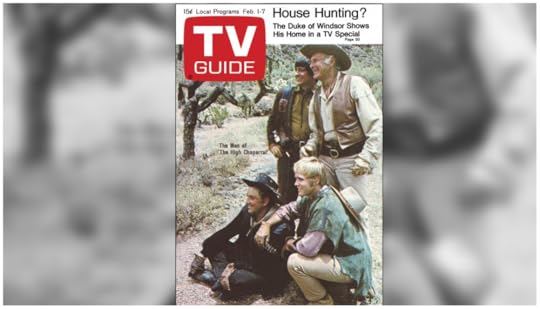
 I think I've written this before—by the way, people sometimes think writers are able to remember pretty much everything we've ever written, and that we're able to recall things at a moment's notice. I'll have someone ask me why I had Winter do what he did on page 142 of The Car, and meanwhile I'll be thinking, "I wrote that?" And when you tell them, they'll ask you in an insinuating way if you actually write your own material. Well, I'd gladly take someone up on that offer, but I'm afraid you'll like them better than you like me, and then the gig will be up.
I think I've written this before—by the way, people sometimes think writers are able to remember pretty much everything we've ever written, and that we're able to recall things at a moment's notice. I'll have someone ask me why I had Winter do what he did on page 142 of The Car, and meanwhile I'll be thinking, "I wrote that?" And when you tell them, they'll ask you in an insinuating way if you actually write your own material. Well, I'd gladly take someone up on that offer, but I'm afraid you'll like them better than you like me, and then the gig will be up. But I digress (and I think I've written this before as well). I think I've written this before, but one of the first things I look for in a TV Guide is a hook, something that I can start off with, which usually allows the rest to fall into place. I've even been known on occasion to reject an issue because there was nothing there to get me started. Those cases are few and far between, but still, unless I'm familiar with an issue, there's that moment of suspense: will I find what I'm looking for, something that jumpstarts the week. Does this issue of February 1, 1969, have anything for me?
And there it is:
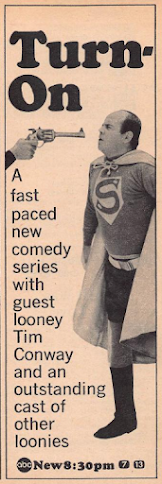
I'm assuming that most of you know the story of Turn-On, the shortest-lived television series of all time (based on the fact that some local affiliates were cancelling it during the broadcast), a show that has become synonymous with the word "fiasco" to the point that it's listed in the dictionary under F instead of T. (OK, I made that last part up, but a guy can dream, can't he?)
The TV Guide of May 17, 1969 , goes in-depth on what it called "The Biggest Bomb of the Season" (yes, I do remember having written that), and it's interesting to look back on how intense the response to Turn-On was, particularly by ABC's affiliates. Robert Doubleday of KATV in Little Rock, one of the show's most outspoken critics, said the network should have listened to people like him warning that "most people still have standards of taste and morality." "It would be a good idea," he said, "to load those people who do those TV series into Greyhound buses and take them on a trip across the country to show them how the rest of the people live."
 What's particularly interesting to me is that we have the next week's TV Guide which, due to printing deadlines, still lists the never-seen second episode (
here's a clip
from it, proving at least that it exists), and one could speculate on what would have happened had the show not been pulled from the schedule so abruptly. Would it simply done its 13-week run and then disappeared? Would the controversy have been replaced by ambivalence, even disinterest? (That might have been even worse.) Would the humor have gotten tamer and lamer as time went on, or would the producers have doubled down on it? Might it even have caught on in certain circles, such as college campuses? Most important of all, what would Cleveland Amory have thought of it? I'll leave all this to people smarter than me to figure out, but it makes for amusing speculation.
What's particularly interesting to me is that we have the next week's TV Guide which, due to printing deadlines, still lists the never-seen second episode (
here's a clip
from it, proving at least that it exists), and one could speculate on what would have happened had the show not been pulled from the schedule so abruptly. Would it simply done its 13-week run and then disappeared? Would the controversy have been replaced by ambivalence, even disinterest? (That might have been even worse.) Would the humor have gotten tamer and lamer as time went on, or would the producers have doubled down on it? Might it even have caught on in certain circles, such as college campuses? Most important of all, what would Cleveland Amory have thought of it? I'll leave all this to people smarter than me to figure out, but it makes for amusing speculation. Remember, all this was long before it became customary for a network to pull the trigger on a program so quickly.* Up to that point, the show voted Most Likely to Be Remembered as a Total, Abject Failure was The Tammy Grimes Show, and that at least made it for four episodes before it was yanked. (According to TV Guid e, that was a disaster, but not a bomb.) And then there's Jackie Gleason's You're in the Picture, another of television's famous Titanics; true, the show wasn't very good, but one could argue that it's remembered more because of Gleason's brilliant apology the next week. Technically, I suppose you could describe it as a single series consisting of one episode of Picture, one episode consisting of Gleason's apology, and eight episodes of The Jackie Gleason Show, the talk show that filled out the ten-week run.
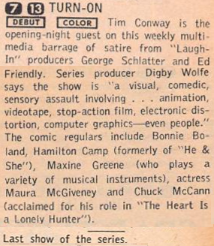 Fixed.*Nine of the ten shortest-lived series of all time, including several that didn't make it to a second episode, have come since 1995.
Fixed.*Nine of the ten shortest-lived series of all time, including several that didn't make it to a second episode, have come since 1995. There have been others since then; Andy Griffith once had two series cancelled in the same season. And I believe there have been a couple of series that were actually cancelled before they aired. But few of them have the fame, or infamy, of Turn-On. When a network acts this drastically, there's no way to keep it quiet, and Turn-On probably became more famous because of it than if it had simply run its course. After all, we're still talking about it, right?
l l l
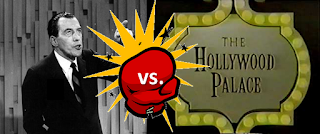 During the 60s, the Ed Sullivan Show and The Hollywood Palace were the premiere variety shows on television. Whenever they appear in TV Guide together, we'll match them up and see who has the best lineup.
During the 60s, the Ed Sullivan Show and The Hollywood Palace were the premiere variety shows on television. Whenever they appear in TV Guide together, we'll match them up and see who has the best lineup.Sullivan: Tentatively scheduled: singers Sergio Franchi and Vikki Carr, the rocking Vanilla Fudge and Temptations, comedians Stiller and Meara, Jacques d'Amboise of the New York City Ballet and the Antonettes, novelty act.
Palace: Host Don Adams swings the spotlight on singers Tony Martin and the Lettermen, dancer Barrie Chase, comic Joey Forman, Ruth Buzzi and Alan Sues of Laugh-In, the juggling Half Brothers and illusionist Igor Kio from the Moscow State Circus.
Neither show has a great lineup this week, neither show has a bad one. I'm not a great fan of Laugh-In (personal preference only), so Alan Sues and Ruth Buzzi aren't going to do anything for me. Barrie Chase is a terrific dancer, but then so is Jacques d'Amboise. I think, although I'm not positive, that Sergio Franchi and Vikki Carr edge out Tony Martin and the Lettermen, so on that very narrow basis, I'm giving the edge this week to Sullivan.
l l l
 Throughout the 60s and early 70s, TV Guide's weekly reviews were written by the witty and acerbic Cleveland Amory. Whenever we get the chance, we'll look at Cleve's latest take on the shows of the era.
Throughout the 60s and early 70s, TV Guide's weekly reviews were written by the witty and acerbic Cleveland Amory. Whenever we get the chance, we'll look at Cleve's latest take on the shows of the era. For those of you who thought that perhaps Cleveland Amory didn't come out during the daytime, guess again. Thanks to a week in bed with the flu, Cleve had the opportunity to become acquainted with Dark Shadows. "At the end of the week, by which time we had decided that this series was, in our considered judgment, the worst in the history of entertainment, we found that when Saturday came and there was no show, we missed it." And that, he says, is the key to the success of this gothic soap opera: "[T]he worse it is, the more you'll love it."
But wait: it gets better. "No matter how terrible you may think an idea is—wait, hold your judgment. The execution of it will be so bad that, in retrospect, the idea seems terrific." The same goes for the dialogue; "once you've seen that action, you will look back on that dialogue as manna from heaven combined with the balm of Gilead." Nobody, but nobody, escapes Cleve's tongue. Joan Bennett, who played Elizabeth Collins Stoddard until she was killed off a few weeks ago, "plays this part as if she'd just forgotten where she'd put it." But then, considering your star is Barnabas Collins (Jonathan Frid), "your friendly neighborhood vampire," who's been dead for 200 years, anything is possible. Frid "is at his best—i.e., worst—when he's discovering something for the fourth time that somebody else has already discovered for the third." And then there are the children, Amy and David (Denise Nickerson and David Henesy): "We swear to you that if we see those two talking to that ghost Quentin through that disconnected telephone one more time, we will call them on a connected telephone and read them his review collect."
Does Amory really like Dark Shadows? What do you think? He concludes with a look at Dan Curtis, the executive producer of Dark Shadows. He declares that he "dreamed the whole story of Dark Shadows during, he says, 'a big sleep in upstate New York.' " Says Cleve, "In that case all you can think, or hope, or even pray is that Mr. Curtis never, ever gets that tired again."
l l l
It's too bad Turn-On overshadows the rest of the programming on Wednesday, because it's a notable night of entertainment, beginning with the Hallmark Hall of Fame production of "Teacher, Teacher" (7:30 p.m. PT, NBC) starring David McCallum as a tutor trying to rebuild a life shattered by drinking and divorce; Ossie Davis, a handyman denied other opportunities because of his race; and Billy Schulman as the retarded youngster who becomes central to their lives. "Teacher, Teacher" goes on to win critical and popular acclaim, as well as an Emmy for Outstanding Dramatic Program; Schulman, himself retarded, is nominated for Supporting Actor. Even if Shakespeare is too highbrow for today's Hallmark Channel, you'd think that a moving story of redemption like this—no, Hadley, don't go there again. Just don't. (You can watch it here .)
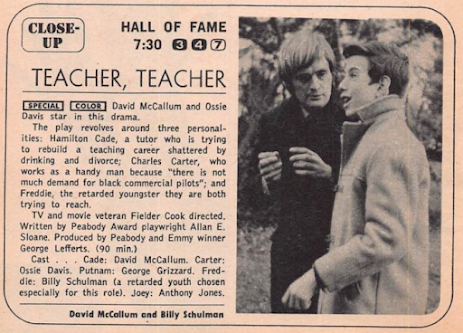
"Teacher, Teacher" ends just in time for you to switch to ABC for part one of Sparticus (9:00 p.m.), the epic adaptation of Howard Fast's novel about a slave revolt against the Romans in the 1st Century B.C., directed by Stanley Kubrick, written by Dalton Trumbo, and starring Kirk Douglas, Laurence Olivier, Charles Laughton, Peter Ustinov, and Tony Curtis. Judith Crist is of two minds about it; it's the rare epic that deals with serious political and social issues, with fine performances particularly from the supporting characters, and has moments that are "literate and even witty." On the other hand, it's also "uneven and dawdling," and Curtis provides "unwitting low-comedy relief as a Bronx-accented Roman poet." Part two airs at the same time next week; Crist thinks "the timing of the film may be helped immeasurably."
With all of that, it's easy to overlook Kraft Music Hall (9:00 p.m., NBC) with Steve Lawrence and Eydie Gorme in "What It Was Was Love," an original suite of songs written and arranged by Gordon Jenkins "as a scrapbook for Steve and Eydie," who had one of the most enduring marriages in show business. With St. Valentine's Day just around the corner, it's not a bad reminder of the important things in life.

Wednesday is the best night of the week by a long way, but there are some other shows of interest, such as Firing Line (Sunday, 7:00 p.m., NET), when William F. Buckley Jr. is joined by our own Cleveland Amory and former bullfighter Barnaby Conrad to discuss animal rights. I also like the program on opposite it, a 1967 BBC production of The Mikado (7:00 p.m., KPIX) starring Cyril Ritchard in the title role with the famed British comedian Harry Worth as Ko-Ko; according to the always-reliable Wikipedia, it's the first-ever color presentation of the Gilbert & Sullivan classic.
There's some prime-time boxing on Monday, which I'm fairly sure I would have watched with my grandfather; George Chuvalo takes on Buster Mathis in a bout between two of the world's top heavyweights, live from Madison Square Garden (7:00 p.m., syndicated). First Tuesday (Tuesday—duh—9:00 p.m., NBC), the Peacock Network's monthly newsmagazine, includes a look at American preparations for chemical warfare, including "animals dying 44 seconds after exposure to nerve gas; human volunteers and animals in 'infection studies'; the manufacture of nerve gas and nerve gas artillery shells; and, briefly, top-secret Pine Bluff (Ark.) Arsenal, a pilot 'germ production' plant." My former home of Minneapolis was the site of chemical warfare experiments in the 1950s; I'll let the morality of all this stand without comment. And on Friday, NBC pre-empts Star Trek for the third-season opener of Experiment in Television (10:00 p.m.), "This is Sholom Aleichem," a series of skits based on the life of Yiddish writer whose short stories were adapted into Fiddler on the Roof. After tonight's episode, the show will be seen on Sunday afternoons, which is probably a good thing.
l l l
I shouldn't forget mentioning a couple of articles of interest. First is Leslie Raddatz's profile of Stephen Young, co-star of ABC's Judd, for the Defense, and since Judd is a program I thoroughly enjoy, I figured I should mention a word or several about it. We find out that the Canadian Young was good enough to earn a tryout with the Cleveland Indians, and he still plays hockey every Sunday night at an arena in Culver City. He's "very aggressive," according to a fellow actor, "but it's a charming aggressiveness. He has a fantastic faith in himself." Carl Betz says Young "just waits to pounce on his lines," and producer Harold Gast says "He's always looking for more to do, so we try to give him a bigger part." He's also popular with his fellow actors; one calls him "a real doll," and another says, "Most of these young actors get fat heads, but not Steve." He's very good in Judd, occasionally getting the lead but never overshadowing Betz. He's also young enough that he's still around today, with his last acting role coming in 2013.
And then there's Robert Musel's witty article about the 74 year-old British aristocrat who's putting his 23-acre French estate up for sale for only $1.2 million. His name is Edward Windsor, although his friends call him David; we know him better as the Duke of Windsor, formerly and for a short time ("Ten months and . . . I can't remember the days . . . oh, 18 days.") he was King Edward VIII. He and his wife, the Dutchess of Windsor, also known as Wallis Warfield Simpson, are being profiled by Harry Reasoner for this week's 60 Minutes (Tuesday, 10:00 p.m., CBS).
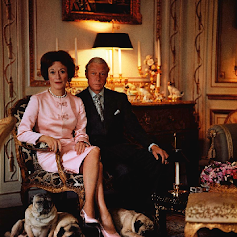 The Duke comes across in Musel's article as a man with a dry, self-effacing sense of humor; at one point Reasoner asked him about the desk on which he signed his abdication—would he leave that for the buyer? "Why not?" the Duke shrugged. And after lighting the logs in the fireplace, he looked around for a place to put the match. "I can't leave it in the ash tray or the Duchess will complain," he confided to Musel. "I am very well house trained."
The Duke comes across in Musel's article as a man with a dry, self-effacing sense of humor; at one point Reasoner asked him about the desk on which he signed his abdication—would he leave that for the buyer? "Why not?" the Duke shrugged. And after lighting the logs in the fireplace, he looked around for a place to put the match. "I can't leave it in the ash tray or the Duchess will complain," he confided to Musel. "I am very well house trained." Reasoner skillfully guided the Duke through the interview. asked. At one point he asked, "How did you feel when you were no longer King?" The Duke smiled faintly. "It was a great relief. But I enjoyed my work for my country." He didn't think his abdication made much difference in the long run; "I think about it," he admitted, but added, "I don't think I would have changed to course of history by not abdicating, not in a constitutional monarchy like Britain." After taking Reasoner on a tour of the grounds ("I probably don't have enough money to buy this building," Harry warned), the Duke sank gratefully into a chair. "Never stand when you can sit, never sit when you can lie down," he explained. (My kind of guy.) "What's the authority for that?" Harry asked. "Old age," the Duke replied. "After 60 something's bound to hurt."
The Duke and Duchess come across as charming, pleasant, enjoyable. A young English girl working with Reasoner and his team, remarked that "If there had been television in 1936, if the British people had been able to see her as she really is, there might not have been an abdication." Musel isn't sure; after all, the issue was that Mrs. Simpson was divorced. And how likely is it that they'll ever allow an English King to marry a divorcee?
l l l
Finally, there's one more premiere this week that bears mentioning. On Friday night at 7:30 p.m, ABC presents the debut episode of a new variety show starring an exciting young Welsh singer: This is Tom Jones. Not only does it last longer than Turn-On, it's a lot cooler. And, like Stephen Young, Tom Jones is still around. And you know what? He's still cool. TV
Published on February 04, 2023 05:00
February 3, 2023
Around the dial

 A lot of celebrities have been dying lately, and while that's kind of a grim way to kick things off this week, it's also a reminder of how much pleasure many of these people have given over the years, and an opportunity to look back at their careers in appreciation. At A Shroud of Thougths, Terence has his thoughts on two such stars:
Cindy Williams
, who died on January 25; and
Lisa Loring
, who died January 28.
A lot of celebrities have been dying lately, and while that's kind of a grim way to kick things off this week, it's also a reminder of how much pleasure many of these people have given over the years, and an opportunity to look back at their careers in appreciation. At A Shroud of Thougths, Terence has his thoughts on two such stars:
Cindy Williams
, who died on January 25; and
Lisa Loring
, who died January 28. At Comfort TV, David takes the opportunity to praise the career of someone who's thankfully still with us, sharing " Ten Reasons Why Shelley Fabares Is a National Treasure ," from The Twilight Zone to Coach, with a lot in-between.
In the mood for "lurid, pulpy, old-school true-crime mellers"? Then you'll want to visit Drunk TV, where Paul reviews the 1995 Lifetime thriller Dead by Sunset , featuring a “Psycho Hall of Fame” performance by Ken Olin. I think I've mentioned this before, but the perfect Hallmark/Lifetime movie would be a three-part miniseries that encompassed all of their genres: part 1 is the meet-cute romance that ends, in the final minute, with the woman's mother getting a call that her daughter has been murdered; part two is the true-crime investigation in which we find that the husband may—or may not—have been the man everyone thought he was; and part three is the courtroom drama, in which we find out just where the truth lies. I might even be convinced to watch this; c'mon, who's with me?
Cult TV Lounge reviews a Twilight Zone classic from the first season: " The Sixteen-Millimeter Shrine ," starring the dazzling Ida Lupino as a Norma Desmond-esque actress who finds her next role, unexpectedly, to take place in the Twilight Zone. A terrific episode.
This is not to be confused with Cult TV Blog, where John continues his fascinating look at pairing up episodes of The Prisoner to make a movie-length story out of them. This week: a continuation of the discussion on "Checkmate" and "Free for All," specifically on the structure and Lewis Carroll references.
At Classic Film and TV Corner, Maddy has a fascinating look at the movie Anastasia , the comeback movie for Oscar-winner Ingrid Bergman—as well as the real-life story that inspired it, that of the Russian Princess Anastasia, who may—or may not—have been murdered along with the rest of her family, including Tsar and Empress Nicholas and Alexandra, by the communists.
Over at RealWeegieMidget, it's the final few entries and wrap-up of the entertaining Muppet Show Guest Star Blogathon . I have to admit I didn't watch this program often, even though it was carried back in the World's Worst Town™; my Muppets were always on Sesame Street, and I never did warm up to Miss Piggy. But you'll find these very entertaining, and the list of guest stars fantastic.
Finally, as promised, check the comments from Wednesday for clues to the TV Guide crossword puzzle. You've got until next Friday to get your answers in! TV
Published on February 03, 2023 05:00
February 1, 2023
Return of the crossword puzzle!

 Awhile back, I came up with the idea of using the famous TV Guide crossword puzzle as a kind of occasional feature, not unlike the TV Jibe cartoons. The last one we did was, let's see—May 24, 2017. I guess I haven't kept up on this very well, have I?
Awhile back, I came up with the idea of using the famous TV Guide crossword puzzle as a kind of occasional feature, not unlike the TV Jibe cartoons. The last one we did was, let's see—May 24, 2017. I guess I haven't kept up on this very well, have I?Anyway, today's puzzle is from Saturday's TV Guide (January 28, 1967), so keep that in mind when you're thinking about the stars and the shows featured in the clues. Use the comments section for your answers, and I'll update our progress on Friday, with the answers next Friday. If you're reading this through Facebook or Twitter, make sure you go to the website with your answers.
Good luck!

 TV
TV
Published on February 01, 2023 05:00
It's About TV!
Insightful commentary on how classic TV shows mirrored and influenced American society, tracing the impact of iconic series on national identity, cultural change, and the challenges we face today.
- Mitchell Hadley's profile
- 5 followers



